From Italy to Eastern Europe, via the Balkans and the Middle East. A year-long backpacking trip.
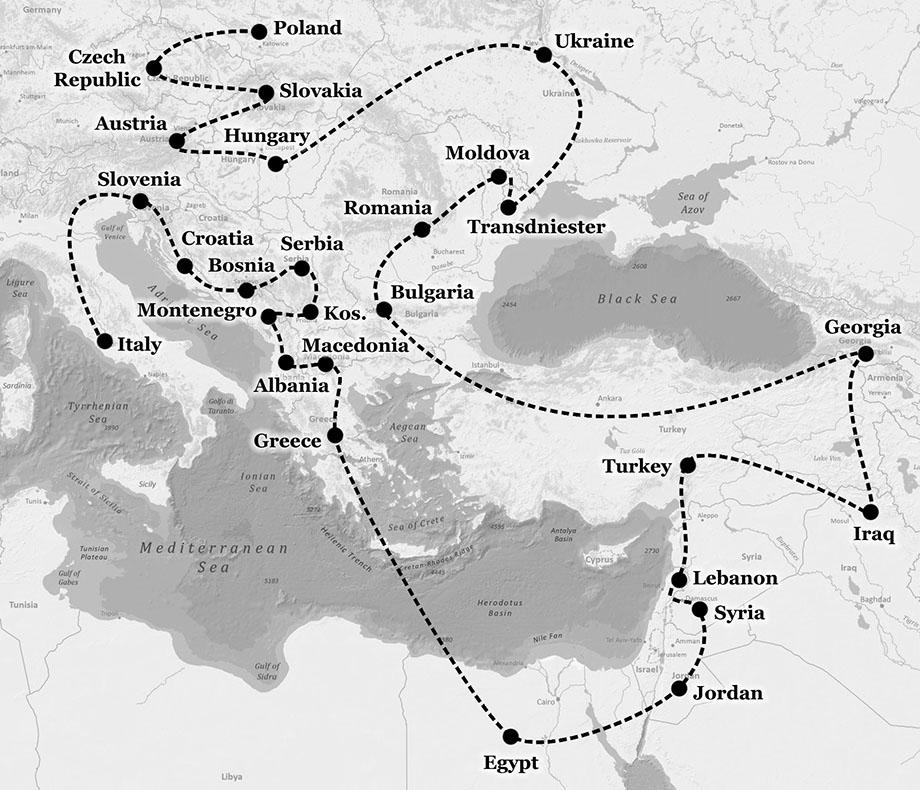
This humble corner will attempt to serve as a travel journal of sorts, cataloging all the ins and outs as, whatever way and in whichever direction the mind meanders, the body does likewise. If you have arrived here, you likely know me, and at least some of the details of this trip. Regardless, welcome, fellow traveler.
Egypt :: Cairo
on Feb. 6, 2009
My one and only flight of the trip: Greece to Egypt, a regrettable necessity. I tried repeatedly on Crete to find passage on a cargo ship headed to Egypt, but this is a very rare request, and ultimately, an unsuccessful one. At the airport I hand over my bag with the necessary blind faith, and have my water stolen from me when I admit to having it. Don’t these people know I’m headed to Egypt, a desert? Obviously not, but still, dam airports. I am curious as to the kinds of people that are flying with me to Egypt – our small group, which fills only four rows on the plane before we all spread out, includes a few Egyptians, a few Asian tourists, and a few whom I classify as British archaeologists based solely on their manner of dress, and who please me greatly with their presence. Egypt is the land of ancient ruins, buried temples, and Indiana Jones style archaeologists, after all. The flight is entirely too short for me to quell my unrest over the unknowns to come. As we land, decelerating down the runway in Cairo, the husk of a rusty and long abandoned plane slides by my window, the fuselage sand-swept clean. Welcome to Egypt.
I am paranoid and cautious from the get go. I have already heard enough stories about scams, touts, and incessant demands for baksheesh (tips) for the smallest service rendered (or none at all, in the case of groups of small children likely to terrorize you for the lack thereof). So thinking, I refuse all offers of assistance, taxis, accommodation, and generally avoid talking as much as possible, only to find myself wandering around outside the terminal, trying to decide which is better: the police in uniform with giant AK-47s slung over their shoulders, or the police (I interpret) not in uniforms, with MP5 submachine guns just dangling out the bottom of their jackets. I am in search of a bus which may or may not have existed three years ago, when my pilfered Middle East Lonely Planet guidebook was written. I have memorized the number of my bus, 356, as well as how the number looks in Arabic numerals: squiggle-circle-backwards seven. The name of my destination, four seemingly random Arabic names, which mean little at the time (Midan Abdel Moniem Riad), proves impossible to master for more than a few minutes, escaping memorization as soon as I think of something else.
Eventually I encounter a hodgepodge of old buses, which I can scan through (Arabic numerals scrawled in windows or taped to signs on the front, if at all) without finding dear number three hundred fifty-six. I ask a few guys standing around – using fingers for numbers still works – who point towards a bus I had already overlooked. A second interpretation of the squiggles has me convinced that it is indeed the one I want, albeit empty, and lacking any sort of driver figure. I amble over and am contentedly standing around when a second bus veers up and the driver shouts at me. Having no clue, I look back at the group of guys and point at this newly arrived bus. I receive thumbs up, and so ascend into the belly of this dark cave – the bus is air conditioned, and all the curtains are drawn to keep out the sun. Careful to avoid sitting next to any women I find a row to myself and plop down. The price, 2 LE (about thirty cents), was conveyed to me by the driver before he grew exasperated by my fumbling and motioned me back towards a seat. I think perhaps he has forgotten, or decided that collecting the fee from a foreigner is hardly worth the effort, but after a few minutes without my appearance he manages to catch my gaze in the mirror and makes the universal sign for money – fingers rubbed together. One of my valuable early lessons: very few things in Egypt are free.
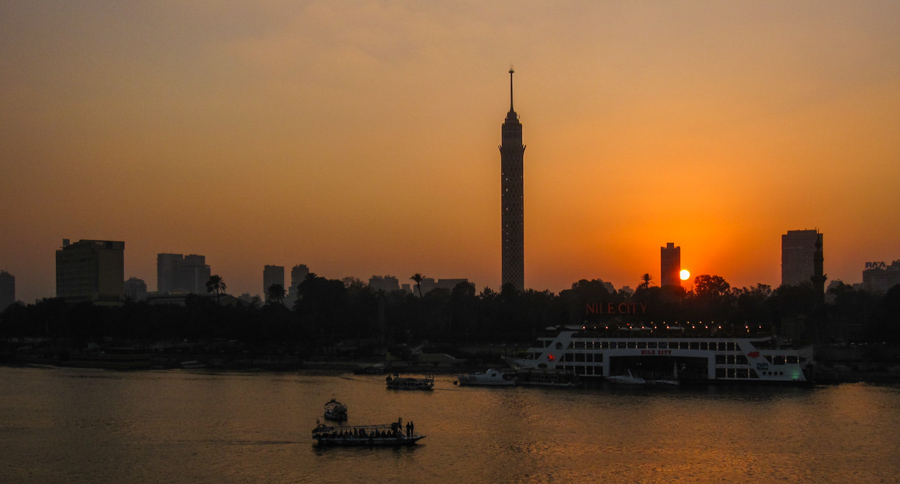
Rather than Tahrir Square, I am dumped at Riad. Which is quite possibly the most intimidating place in Cairo to make your first acquaintance. The hub of bus and microbus travel within the city, it is a giant roundabout with hundreds of buses milling about in the center, a few freeway sized streets and a handful of smaller roads diverging in and out, the entire affair underneath an elevated highway – an on-ramp to the main bridge over the Nile. The constant cacophony of horn blasts is more impressive than any I ever heard in NYC, and cars weave about in acrobatic maneuvers, trying to wrangle any advantage possible from the press. Bring up Cairo with any traveler and a subject sure to arise is the art of crossing a street – a skill which my guidebook proclaims as the most dangerous part of mastering the city. I would have to agree. A rather extended, and exhausting, adventure finds me, before dusk, at Wake Up! hostel. But I am soon back out on the streets, to catch my first sunset in the dusty sky of Cairo, overlooking the Nile.
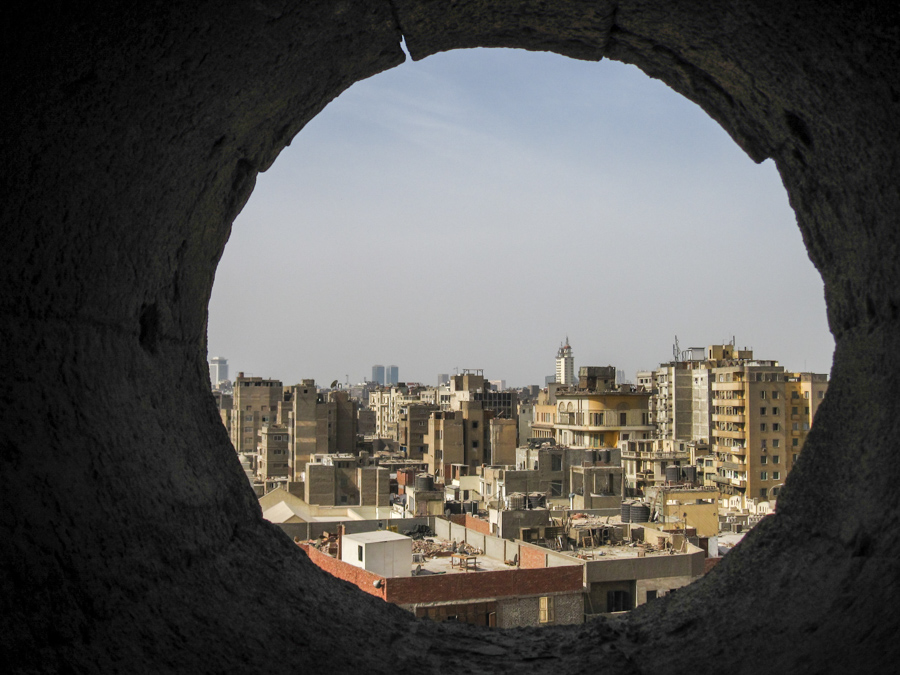
Modern Cairo is a sprawling cacophony of hot, dusty streets and concrete buildings.
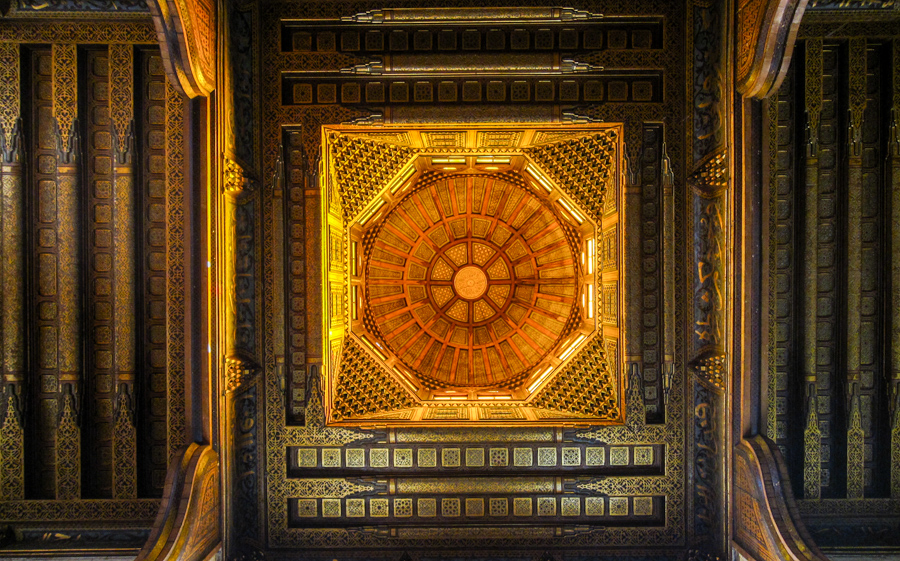
And a world of contrasts. My explorations take me far and wide - in Cairo I walk. Enough that, by the end of each day, I am utterly exhausted with legs complaining in aching agony. The Garden City, greatness fallen into disrepair, everything covered in a layer of dirt and grime marking the end of some era of importance. Manial, the little island neighborhood. The Aqueduct of Al-Nasr Mohammed, an impressive divide of the city's neighborhoods. The Mosque of Amr ibn Al-As, and Old Cairo (or Coptic Cairo), the Christian area of the city, and the Hanging Church. Back across to the west side of the Nile, up past the Cairo Zoo, and Cairo University. To Gezira, past the Opera House and the Cairo Tower, dazzling by night.
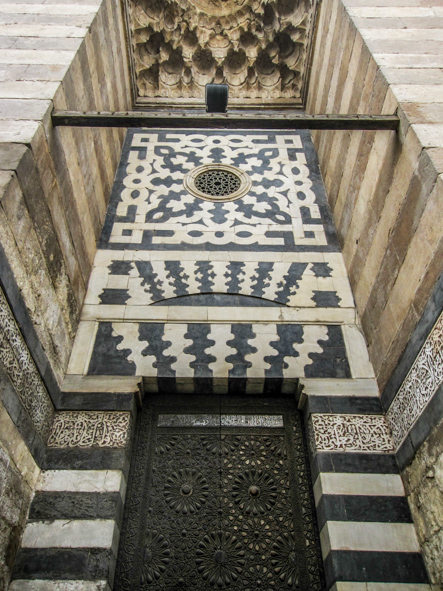
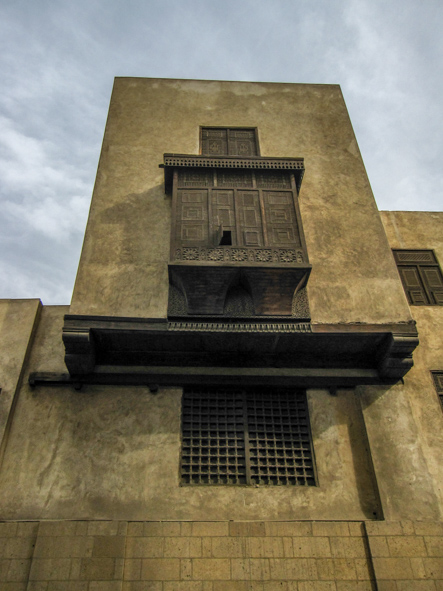
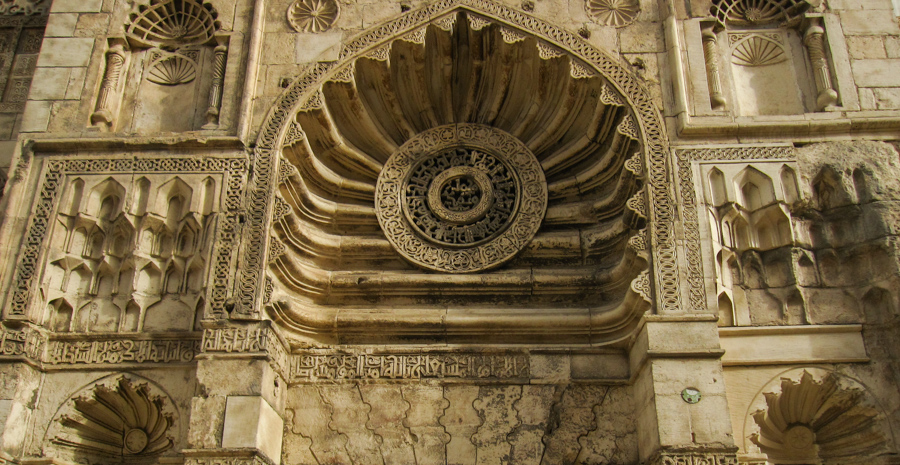
The Egyptian Museum: what would make half a dozen museums in Italy or Greece is, here, piled in dusty room after dusty room, entirely bereft of any explanations, in any language. Except for the famous highlights, most seem rarely visited. I get hissed at for getting too close a few times - oh the hissing! A truly Egyptian admonishment. The most impressive part of the place is, by far, the collection from the tomb of King Tut[ankhamun], including his solid gold death mask and the series of gold shrines which fit into each other like a set of matryoshka dolls. At their center, his sarcophagus.
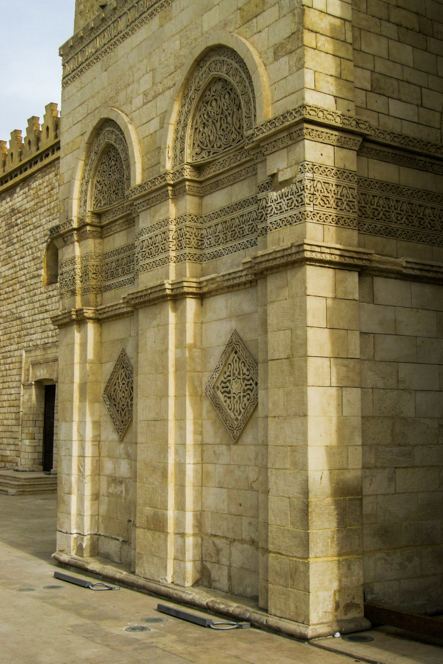
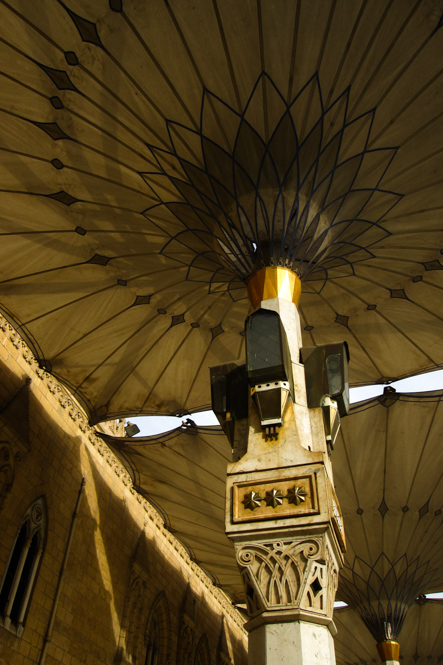
Further destinations: Midan Ataduq, the Khan al-Khalili great bazaar, which is chaos personified. The Mosque of Al-Ghouri, with a baksheesh-inducing minaret climb. The al-Hussein Mosque, an impossibly beautiful building teeming with guys headed in for prayer time. The streets of the bazaar take me past more mosques, mausoleums, madrassas, and Islamic architecture than I can remember. The Street of the Tentmakers (a nice name with no apparent connection to the actual goings-on), and out to the Citadel. Neighborhood after neighborhood which are either focused on repairing cars, or hosting the old men for shisha and black tea on every corner.
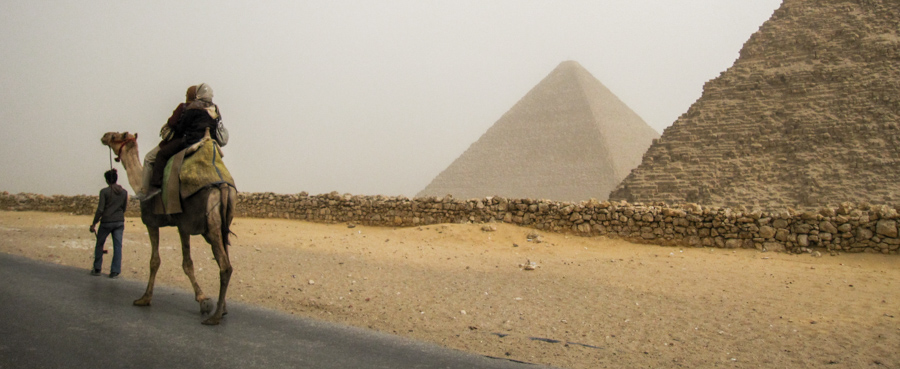
The local pyramids, or, more fancifully, The Great Pyramids of Giza. Like the Colosseum in Rome they have snuck up on me, and the time is at hand to join however many thousands of other tourists in the pilgrimage. Stubbornly I refuse the idea of a taxi, the usual mode of transport, opting instead for bus #357, which 'may' be catchable from Midan Tahrir. By the time the third bus zooms by, with a series of likely matching squiggles for a number, I am in position, but it evades me on the inside lane of a massive traffic circle. Having had enough, I am standing in between lanes of traffic dodging cars to flag down the next bus (do not worry, dear reader, this is not unusual behavior, I have many compatriots with me out dodging honking cars). It slows just enough for me to jump on, but not enough to waste precious momentum (or gas, for that matter).
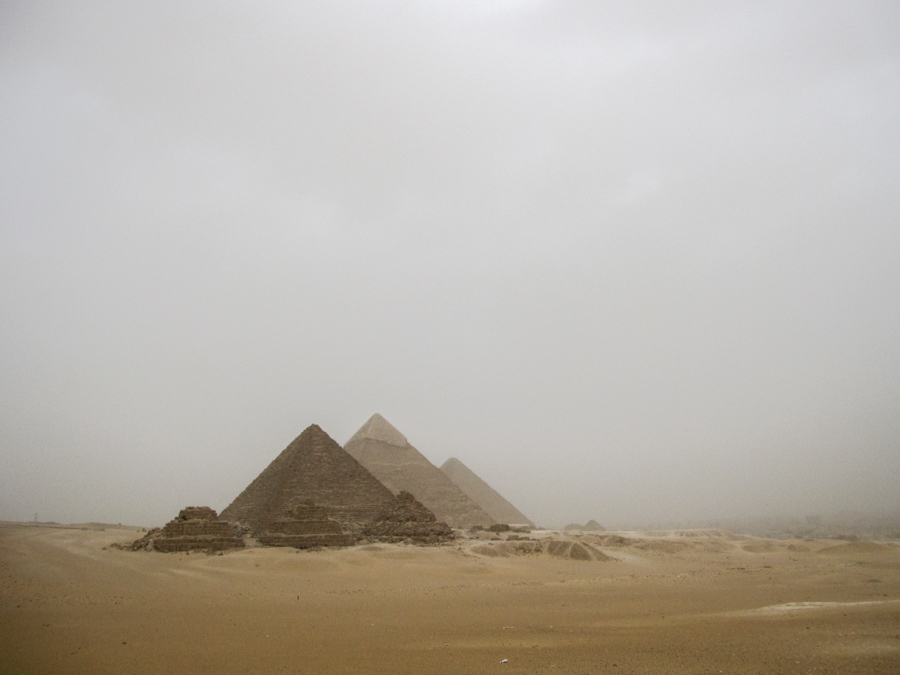
Today was perhaps not the best day for Giza, I arrive in a mild sand storm. The smallest of the three: the Pyramid of Menhaure (62m), where a camel-mounted, AK47-wielding guard helpfully asks if I would like to climb to the top of the pyramid (he's joking...). The Great Pyramid of Khufu (146m), an amazing crawl into the belly: cramped, dark, panting up tunnels which are so low I have to bend halfway over, or actually crawl, as kids half my height zoom past -- not for those wary of confined spaces. The inner chamber, it strikes me, is perfect. Sides made from huge interlocking blocks of dark stone, perfectly smooth and joining at sharp points. Just standing, breathing, I am struck by the thought that the pharaohs achieved exactly what they sought - immortality in the minds of men. I also remember Cam's plan to buy a valley in Southern California and build a giant pyramid, of which I now wholeheartedly approve. Lastly: the Pyramid of Khafre, plus the Sphinx, and convinced that I want to stay for the nightly "Sound and Light Show", but bereft a ticket, I find the perfect perch on the dark rooftop of a nearby apartment building, my only companions a flotilla of satellite dishes.
While everyone else heads home in their giant tour buses, I set off through the dark suburbs of Giza in search of bus #357. I learn that hailing down a minibus can be even more difficult than I had imagined, especially at night. You shout your destination to the helper who tends to hang halfway out the door, as they drive past, and if one comes to a screeching halt you run after it before they decide you're not worth the trouble and continue on. Still, necessary skills for Egypt.
Egypt :: The Desert
on Feb. 11, 2009
An early morning and a rather abysmal negotiation with a taxi driver lands me at the bus station in Cairo, and soon I am en route to Marsa Matrouh, way up North on the coast. A quite stop to drink tea with the locals and I continue on to Siwa Oasis, ridiculously far from Cairo and only 80km or so from the Libyan border. The bus stops at sunset at a little cafe in the middle of the desert, in the ever infuriating chai break, every two hours or so, of any bus ride in Egypt.
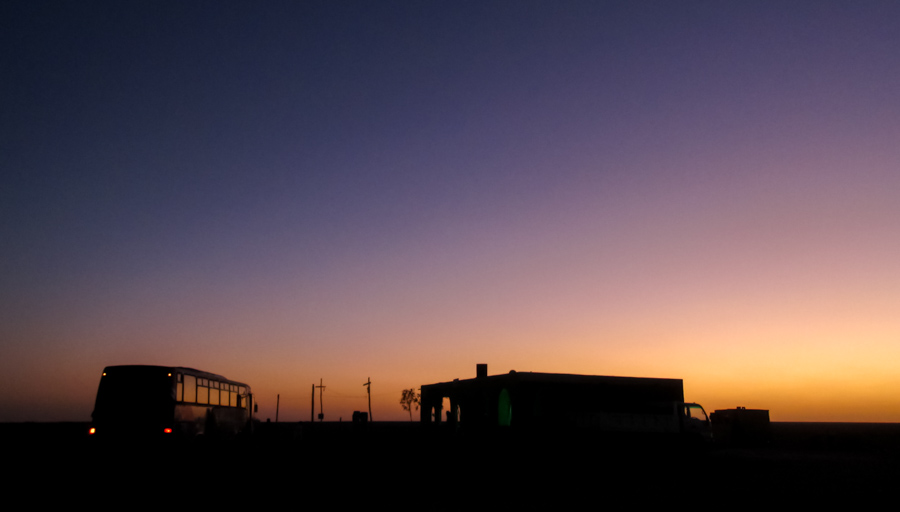
Much, much later we pull into Siwa, where I am quickly offered a taxi service to the hotel of my choice. The "Siwa 4x4 Taxi" service, the only game in town, is certainly unique.
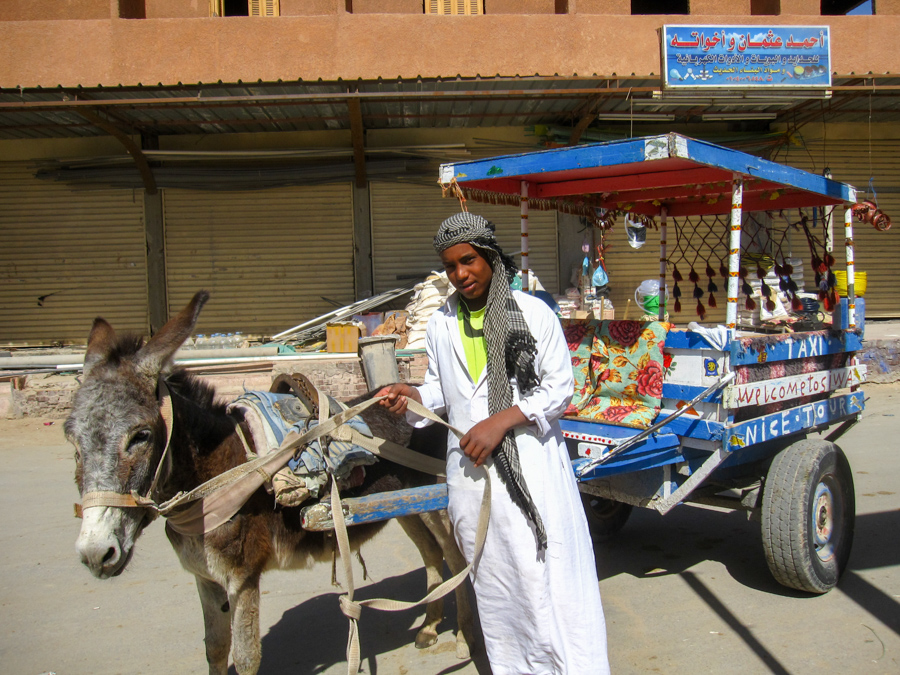
By day it is a bit of a dusty town stuck in the middle of nowhere. Not quite the palm tree filled oasis I was imagining, but beautiful. The old mud-brick citadel stands on one of the two rock formations standing proud in the town center.

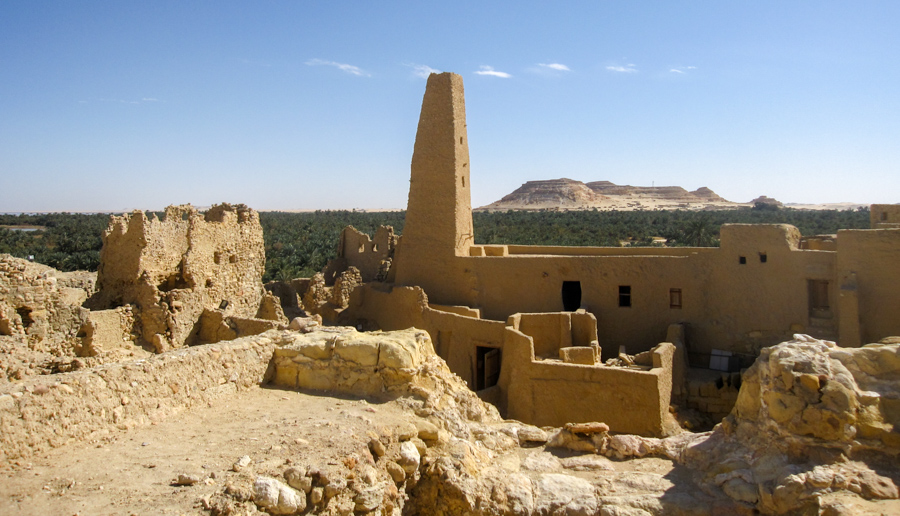
I sit down for lunch in a little restaurant and am quickly introduced to a Bedouin safari driver - he's headed out for some sort of adventure later that afternoon, and already has a few people. Skeptical, to say the least, I decline, but as I am walking away realize that I had wanted to do something like it all along and refusing was an exercise in stupidity. I trudge back and shake some hands, hand over my passport to get "permissions" from the government, and set a date to meet at 2 in front of Abdu's, the local hangout. By 2:30 I am a bit worried, and it is around this point that I realize I have given my passport to some Egyptian guy whose name I don't know and with whom I have no way of getting in touch. Humanity is good, I suppose - he shows up in a brand new Land Cruiser a few minutes later and I pile in the back with four guys from the university in Alex. For the next few hours we zoom around the sand dunes, careening down dune faces a few hundred meters tall while blasting Egyptian techno, swimming in hot springs, sand boarding (!), and cooking up chai on the fire. Night finds us in a giant Bedouin camp, eating dinner, smoking (the local specialty is hashish), dancing and singing around the fire.
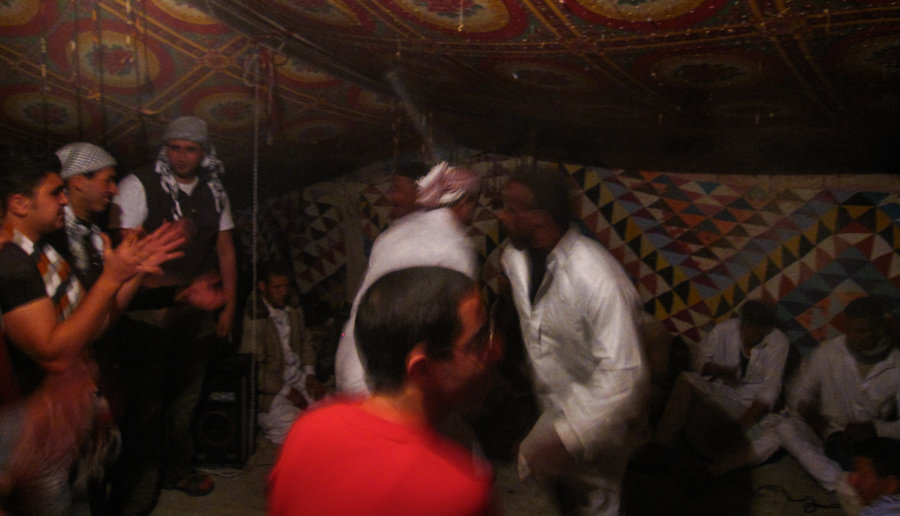
Why not? The next morning I rent a bike and have one of my most satisfying days in Egypt, puttering around the Oasis. I stop at a few of the highlights on the ridiculous hand-drawn tourist map, some ancient ruins and a castle. I zoom by the Cleopatra Spring and spot a blond girl lounging in a hammock at the spring-side cafe and decide I am a bit thirsty for a nice mint tea. She turns out to be from Canada, on the beginning of a trans-Africa (Egypt to S. Africa) trip, but has been working at the cafe for a month, living in a mud-brick house, bicycling to work every day. What a life. She, a few weeks from now, will turn out to be a terrible influence on me, but that is later. For now, she recommends a ride out to Fatnas "Fantasy" island (it's not actually an island) for the sunset, which is beyond beautiful.
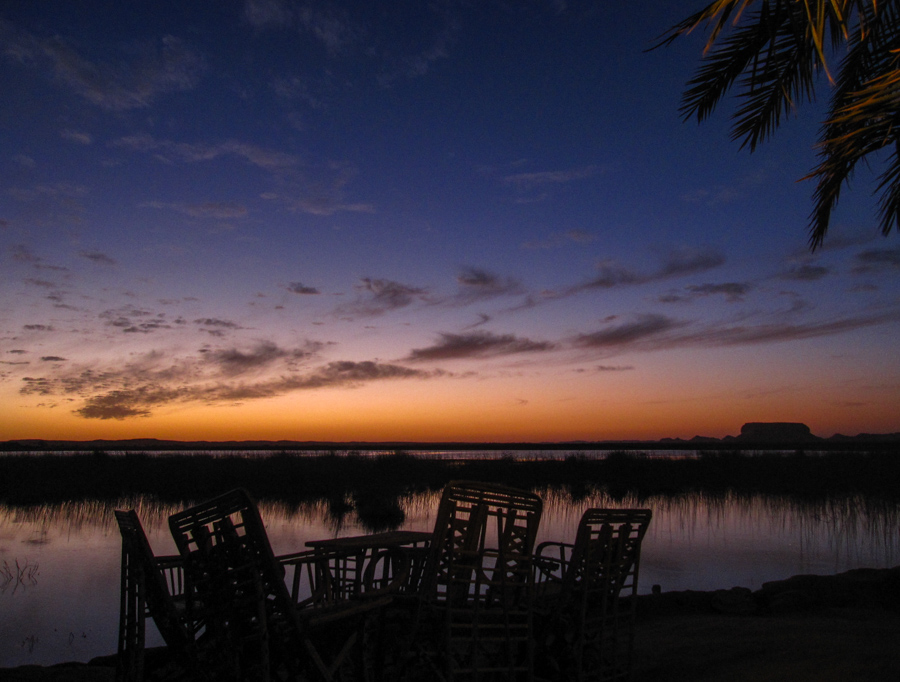
I run into her again that night for a dinner at Adbu's before jumping on the overnight bus to Alexandria - twelve hours of freezing cold misery, packed like sardines with all the Alex kids heading back from their long weekend holiday. Alexandria itself isn't quite what I expected - different from Cairo, more modern, western, less chaotic, and less of what I think of as Egypt. The gardener of the fabled Library of Alexandria (modern vision):
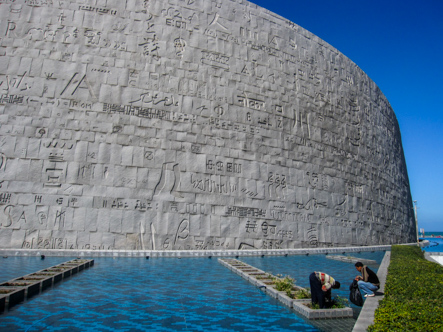
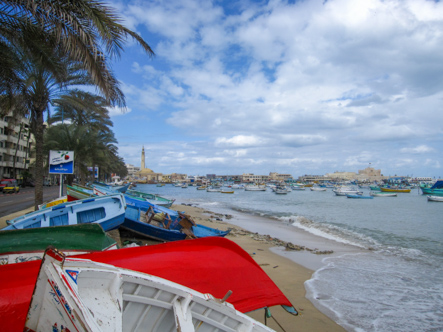
I meet a guy from Alex in the library who convinces me I should stay and teach English - I get the feeling I will be on the receiving end of quite a few job offers. Must be careful, could spend the next six months living in some desert oasis instead of traveling around the world. People seem to have a tendency to get stuck in Egypt. I take the train back to Egypt through the Nile Delta to Cairo en route to the other four, Western Oases.
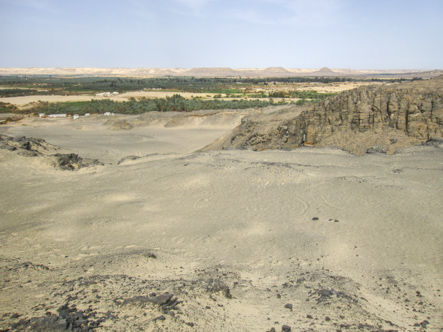

I jump on the bus out to Oasis #1, Bahariya, and spend a day walking around, get a ride with an alfalfa farmer on the back of his donkey cart, meet a handful of safari drivers anxious for my money, and spend a night out in a desert camp with a Belgium guy who regales me with tales of the beauty of prostitutes in Prague. The desert is a strange place.
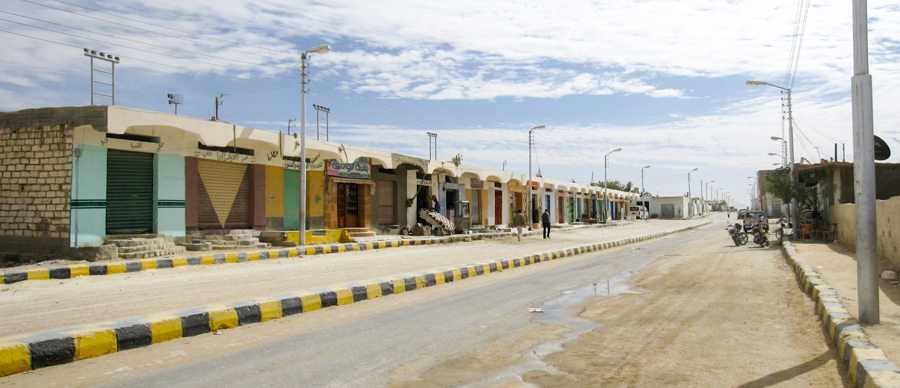
The next day I am off to Oasis #2, Farafra, which for anyone thinking of going there, let me be clear: it is a must skip. I am in search of a week long camel trek out into the desert, with no goal other than riding around and getting lost, but it proves more elusive than I had hoped. In the end, Farafra (home of two hotels, one cheap and one expensive, and a tourist police force so bored they are happy to escort me anywhere and everywhere I might want to go) must be escaped. The only way is a minibus, filled with locals, out to Oasis #3, Dakhla. My first long distance minibus experience, an excruciating four hour ride with the never-ending scenery of sand. Sardines.
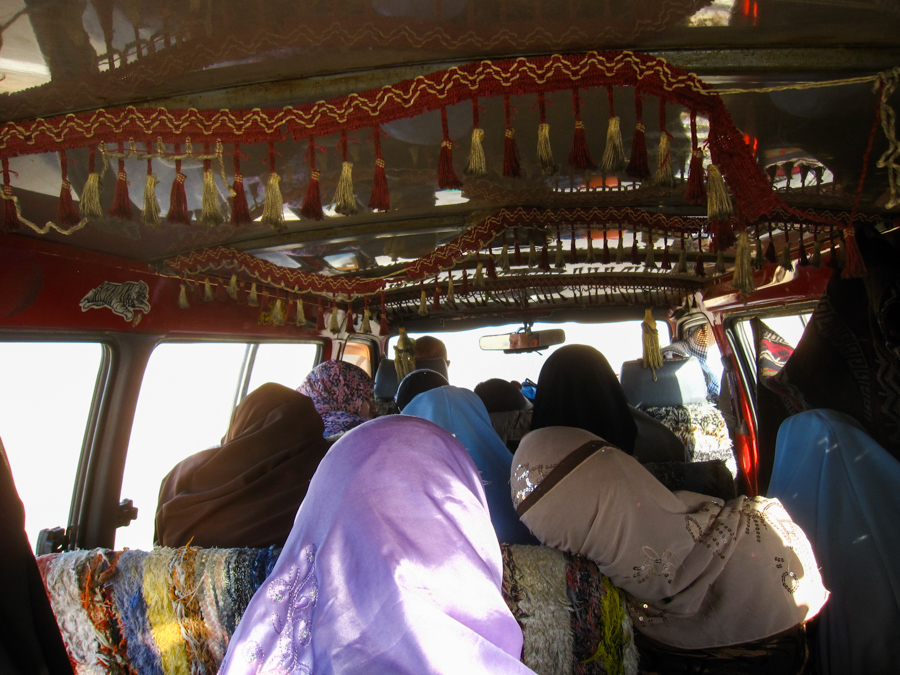
In Dakhla I run into Zarif (of Cairo pizza fame), traveling with Anna from Austria, a girl who seems to speak a dozen languages, including Arabic. We get a tour around the oasis with the son of the hotel owner, Sameh, sit down for some tea with a group of old ladies (lesson learned: when greeting the man of the house, never have your legs crossed, put your feet flat on the ground, and dear god stand up when shaking hands - have some respect), careen about the sandy streets as Anna tries to learn how to drive manual on Sam's ancient land rover, and go swimming in a hot spring at midnight under the stars. And, Zarif tries to steal a puppy from some local kids. (They offer to sell him for 10 LE).
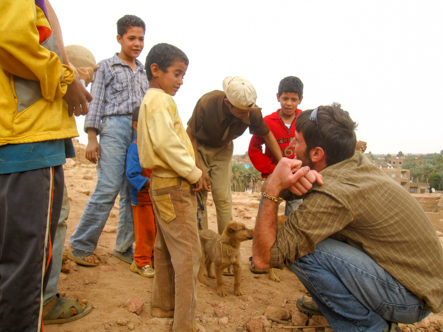
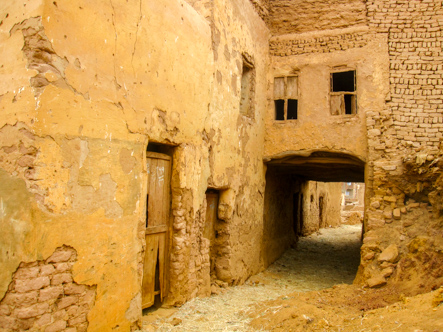
Away from the main city in Dakhla, Mut, is Al-Qasr, an old Islamic city mostly abandoned, filled with amazing doors, windows, and all manner of good photos. Not sure what this is.
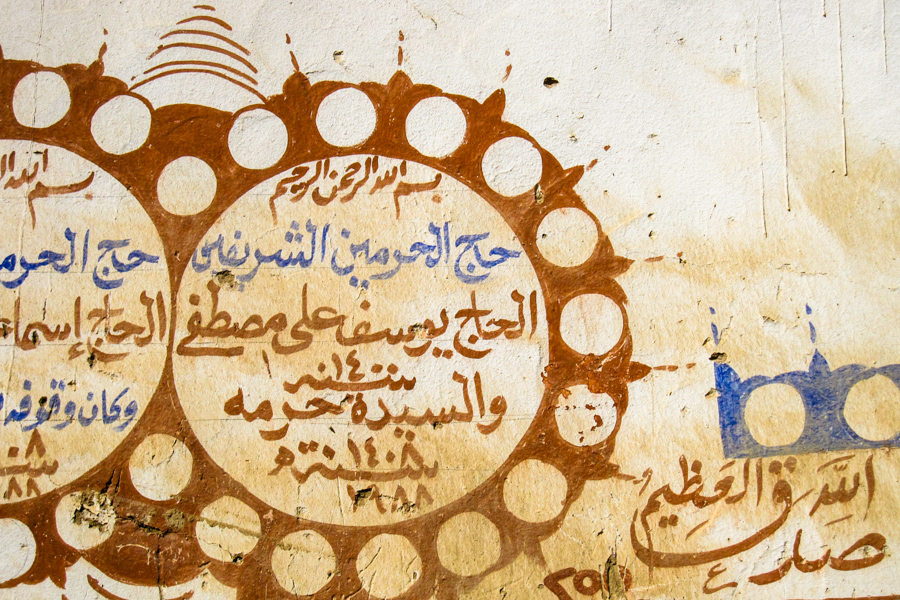
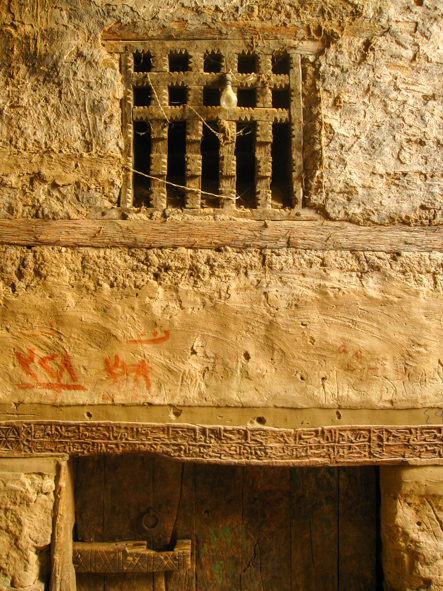
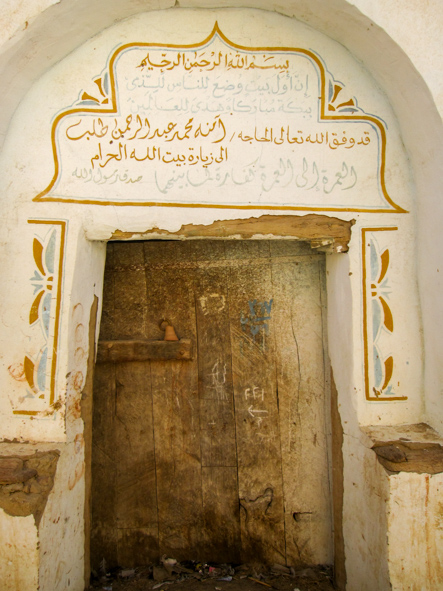
A bit of the true "oasis" feel as well. Gaggles of little boys chasing after me, shouting a never-ending stream of hello's and what's your name's. A true, and by now well loved, welcome for any foreigner.
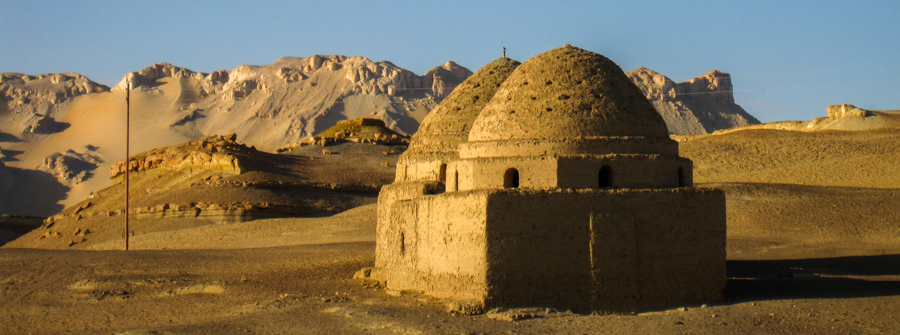
Last is Kharga Oasis, #4, home to the center of the New Valley government (the "Old Valley" being the overpopulated Nile, from which the government is trying to relocate people out into the "New Valley", i.e., the middle of the desert where it is tough to make any sort of living). A bit big, and modern, I wander out into the desert to find some sand dunes.
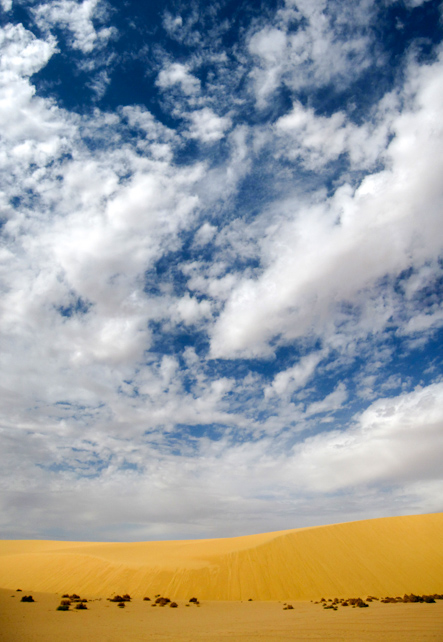
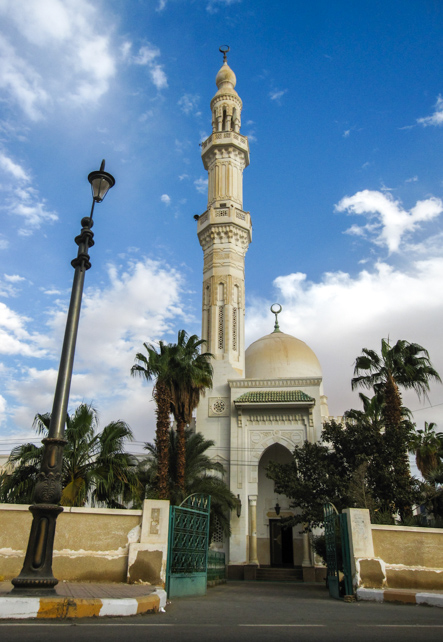
The desert is where I learn the "Egyptian price" of things. For instance, that locals buy three taamia for 1LE, whereas in Cairo they cost a tourist at least one each. One of the most infuriating things about Egypt is definitely that price is a subjective thing, based on your ability to bullshit first and foremost. Inflation for tourists I estimate between 5-10x for literally everything sold and every service rendered. Kharga also marks the beginning of the ubiquitous sweet stands, on every street corner and always filled with indulgent locals.
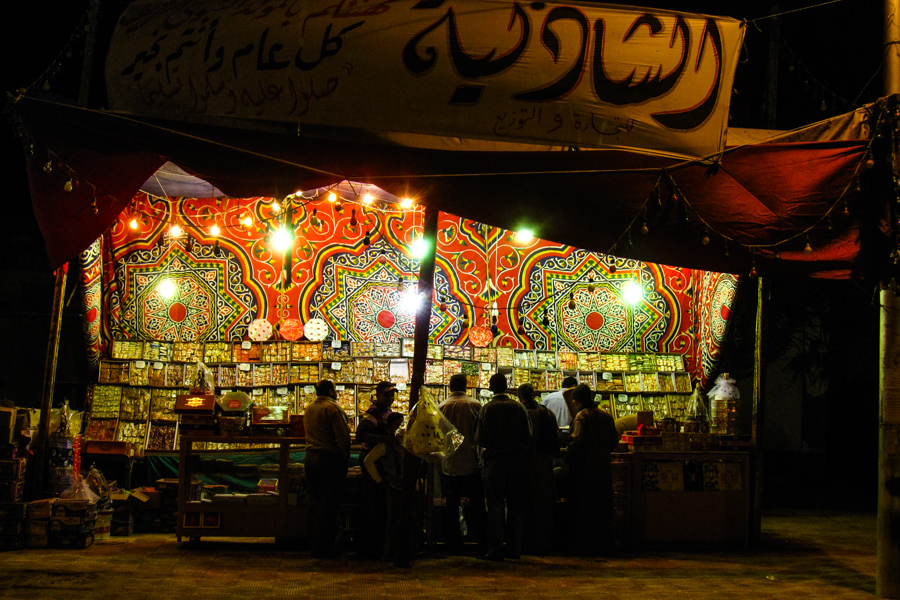
From Kharga I hoped to head down to rejoin the Nile and the land of green at Luxor, but learn that the brand new highway leading in that direction is, of course, bereft of any sort of public transport. The only option is another microbus up to Asyut, halfway between Cairo and Luxor, a no man's land where the Egyptian government is less than happy to see any tourists go. In fact, on the train from Cairo to Luxor it is virtually impossible to get off anywhere in the middle. I arrive, local style, and am under the police radar until I walk up to the train station in search of a lift down to Luxor, at which point the AK-47 touting tourist police spot me and freak out, shouting and running towards me. I am soon in possession of my very own, heavily armed, police escort.
So Asyut is, in theory, a center of fundamentalists not all that happy with tourists or Westerners in general, but what a joke. They demand I wait in the cafe at the train station for the train, but I decide to go for a bit of a walk, and my escort loosens up a bit when I buy us a pair of fresh orange juices. The train, it turns out, is full. But not to fear, they are adamant about my departure and quickly locate some hapless Egyptian man, remove him from his seat, and plop me down in his place. I spend the next five hours on the train sitting next to his buddy, while he stands (he refuses the seat back). Oh well, goodbye to Asyut. The Egyptian government is a bit paranoid I think - the "tourist trail" is heavily enforced here, though all so easy to slip out of.
I have left the desert.
Egypt :: The Nile and Sinai
on Feb. 25, 2009
Across the river from touristy-beyond-belief Luxor is Ancient Thebes, home of some of the most impressive funerary monuments in Egypt. To cross to the West bank you must avoid first the boat captains, then the taxi drivers, and then the bike rental kids. Then the ticket office, for a separate ticket to each site, and most unhelpful. Then the guards, at each tomb and temple, who first demand you relinquish your camera (to be returned only upon receipt of a small tip), and then give an uninvited escort/tour (with the expectation of a small tip). Of course, as with most things in Egypt, the caveat is that it's worth it. Coming out of a tomb in the Valley of the Queens, the guard and his cubbyholes for cameras.
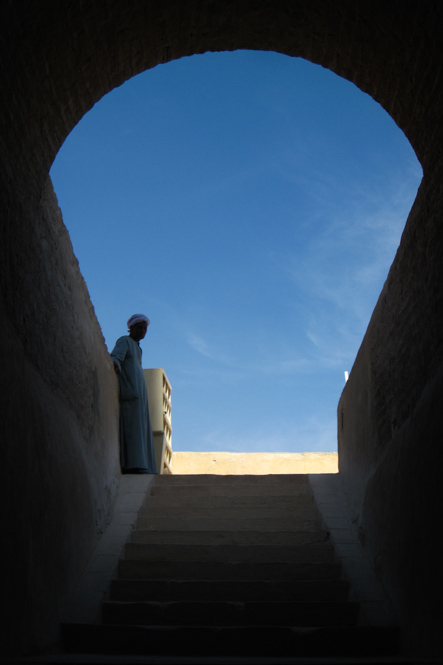
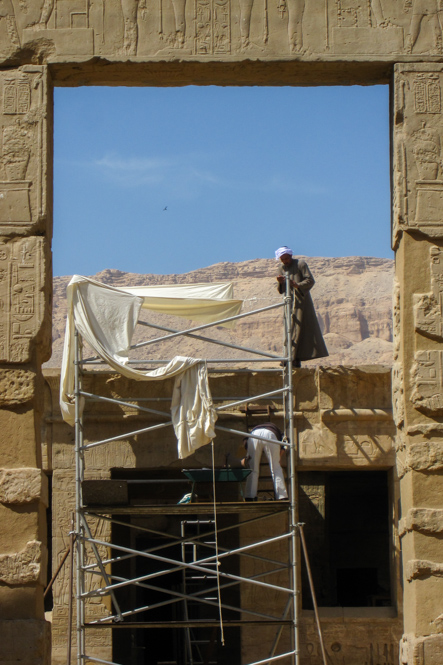
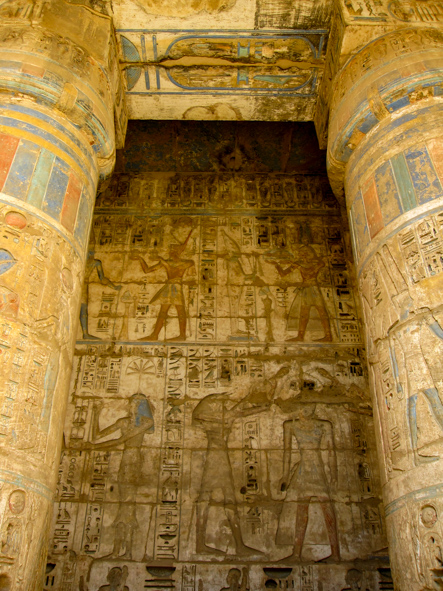
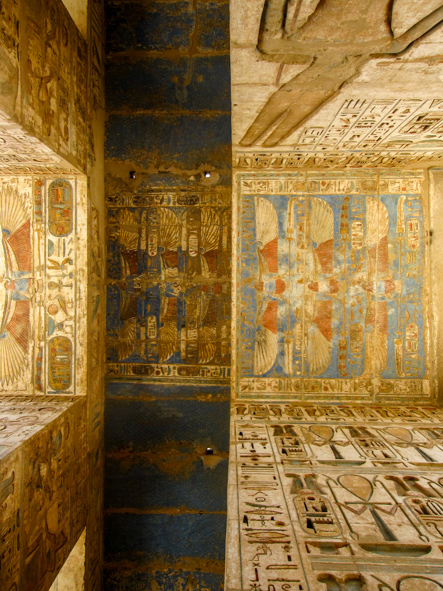
Also amazing, the Habu temple, Deir al-Medina, the awesome-sounding Valley of the Kings (including King Tut's tomb, for an extortionate price, and the rumor of some tomb that costs $10,000 to enter).
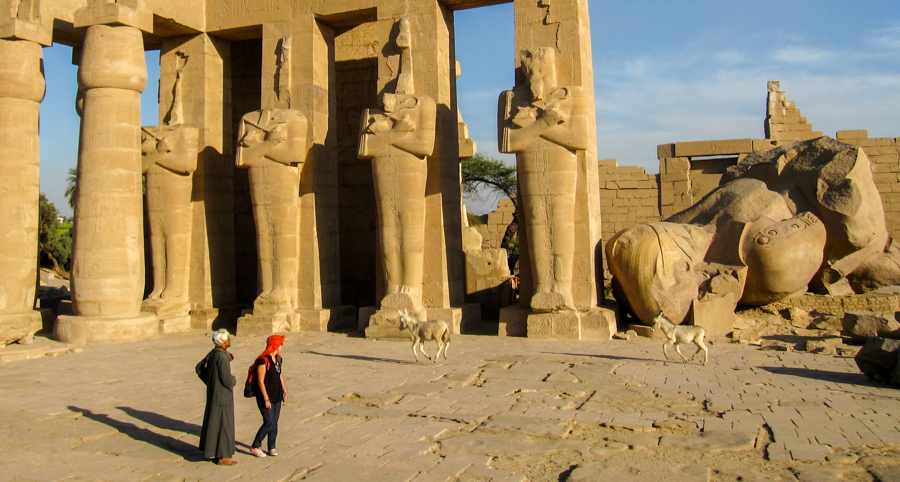
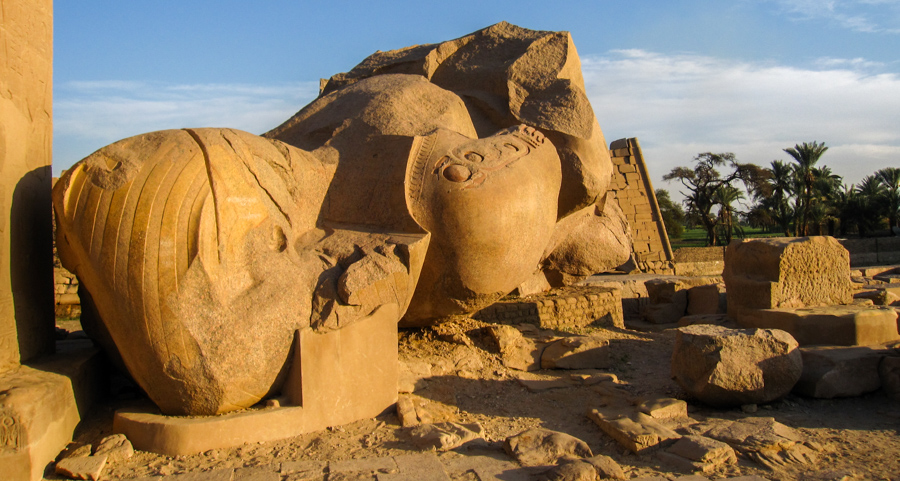
Holy light at the Ramesseum, which for some reason is mostly skipped.
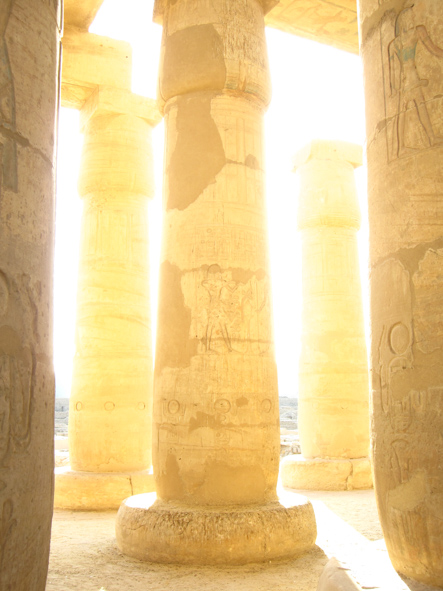
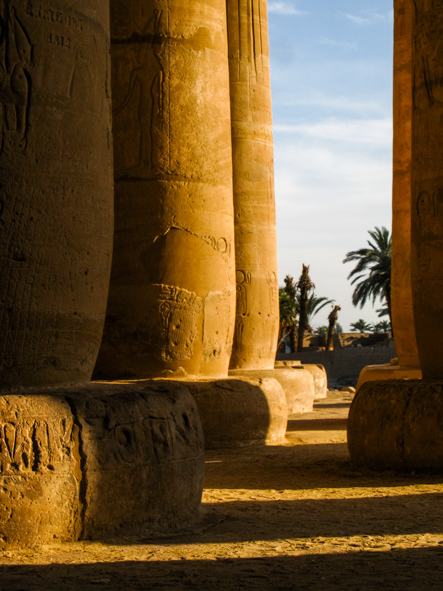
Day one I spent hiking around, getting funny looks from people as they cruised by in their air conditioned tour buses. I wasn't alone though, you can always spot backpackers a mile off as they walk through the desert, refusing any more expensive mode of transport. In this case, back through the fields on the west shore of the Nile.
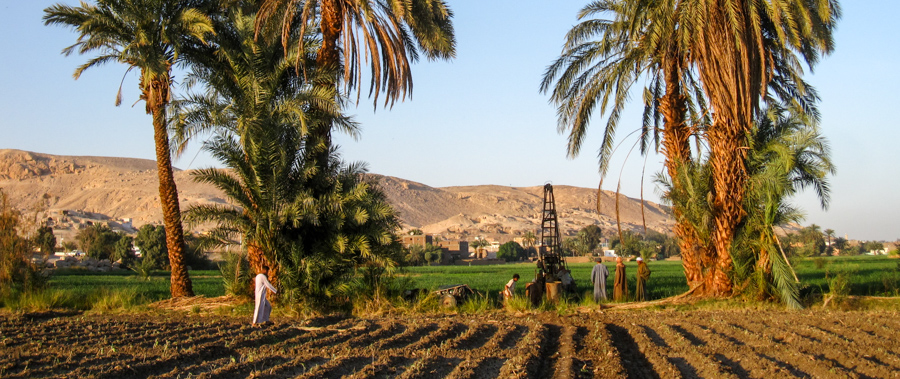
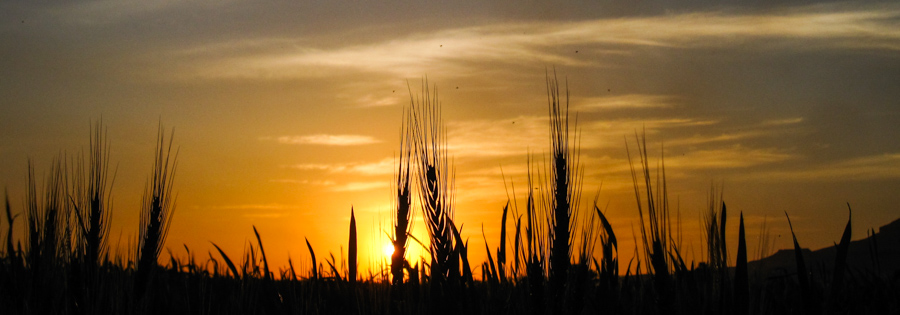
Day two, and I have reconnected with Gillian, the Canadian girl I first met in Siwa Oasis, who appeared randomly at breakfast one day at the Bob Marley House Hotel. Yes, that's where I stayed. Picked, from a long list, because it had a cool name. We are sucked into a private boat ride across the Nile (for the same price as the public ferry, 1LE, why not?) whose captain, funny enough, has a brother that drives a taxi, more than willing to drive us around all day, and a friend that owns an alabaster shop, an essential stop, with kids out front pretending to chisel pieces of stone (the contents of the shop entirely Made in China).


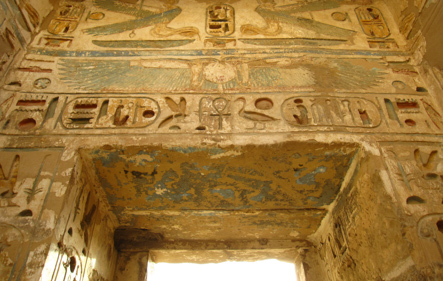
And, we made the acquaintance of an old man with a hut on the side of the Nile ("The Cave") which seemed to be the place where all the guys came to drink beer (not allowed) and hide from their wives. Good times pretending that we are married, anything to slow the barrage of marriage proposals she got from every direction. Enough said. It was an expensive day.
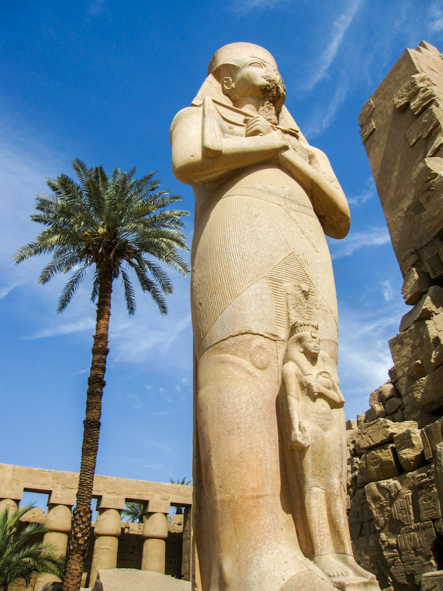
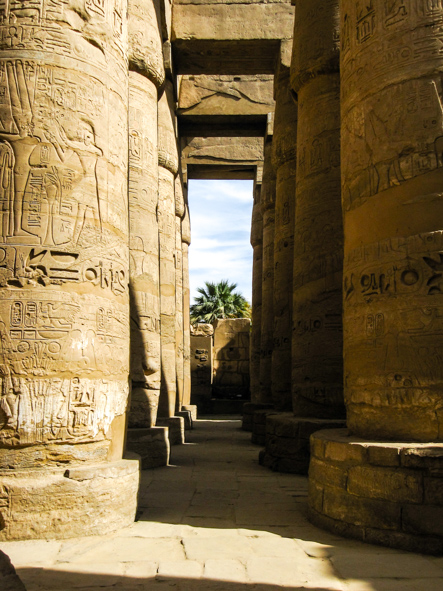
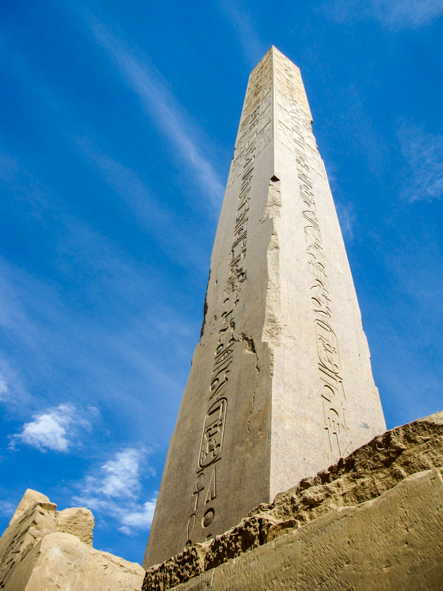
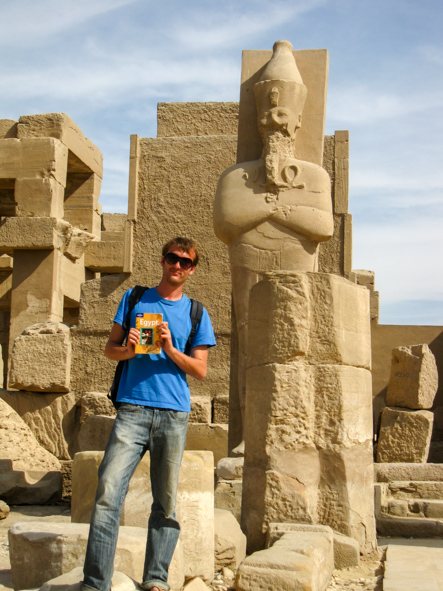
Luxor Temple and Ancient Karnak, the author pictured proud with a Lonely Planet guide book. Interesting adventures in Luxor, at the Kings Head Pub and Red Lion Disco, and my first experience riding on a motorcycle - balancing a box of beer on the way back. Many an interesting night, on and off the rooftop, with the Bob Marley crew.


After way too long in Luxor, we made the train down to Aswan, home of relaxation, and feluccas.
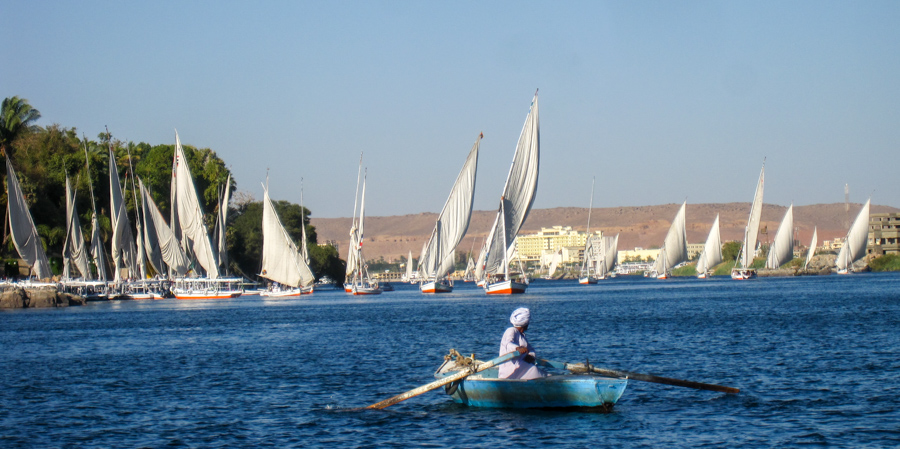
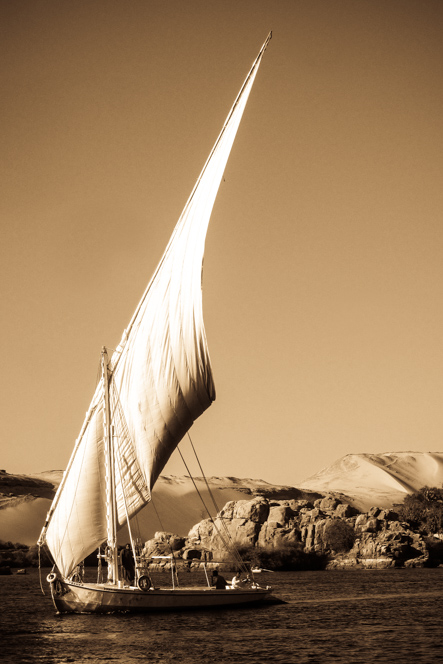
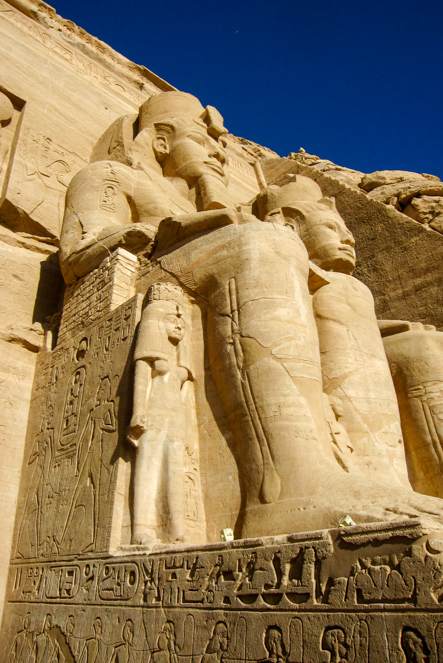
This fine chap rowed up to me while I was exploring Elephantine Island, bringing with him a lunch gift of falafels. Amazing - I hope he made it through the armada of feluccas setting sail at sunset. Aswan included a 4am tour down to Abu Simbel (40km from the Sudanese border, not pictured) well worth the torturous ride and the crowds. And, who could possibly go to Egypt and not go on their very own felucca ride down the Nile? Our "3 days, 2 nights" sailing extravaganza took place, on the recommendation of the crew from the Bob Marley House, on the Bob Marley Home felucca. Captain Bob, naturally (not his real name). They love Bob Marley down here.
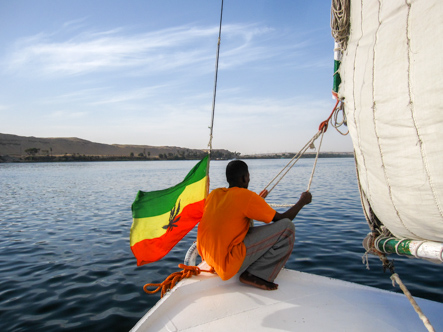
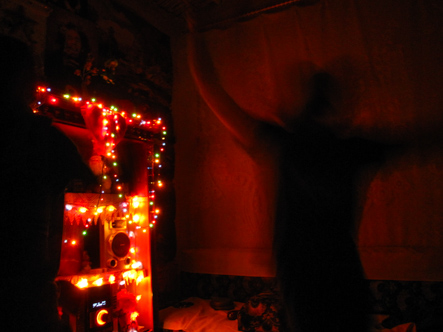
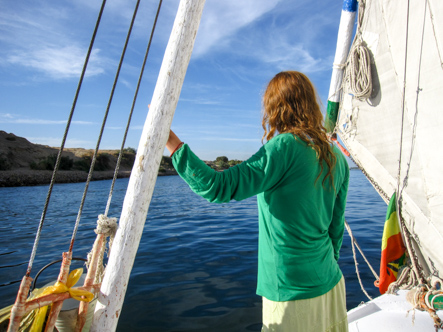
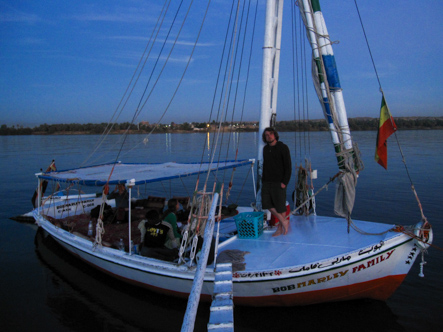
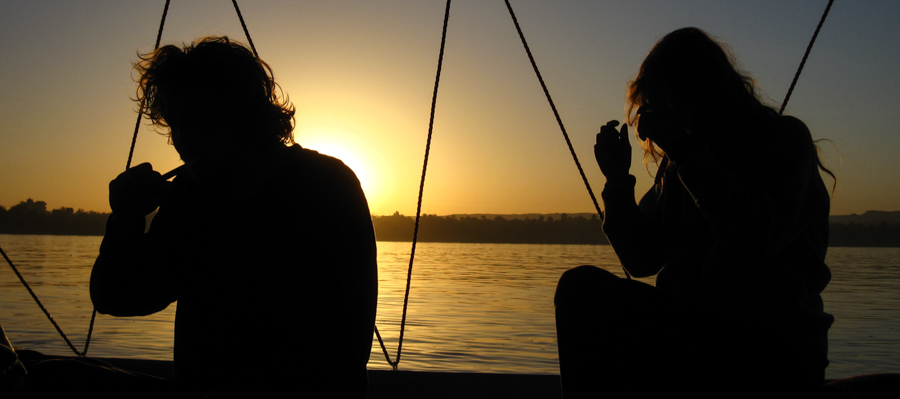
Our group: myself, Gillian, Bryn (another Canadian we pick up and I am unable to shake off until after Turkey!), and Melissa & Shawn (Canadian...). Still, good times, even if it was more of two days floating down the river, as slowly as possible, and not doing all that much sailing.
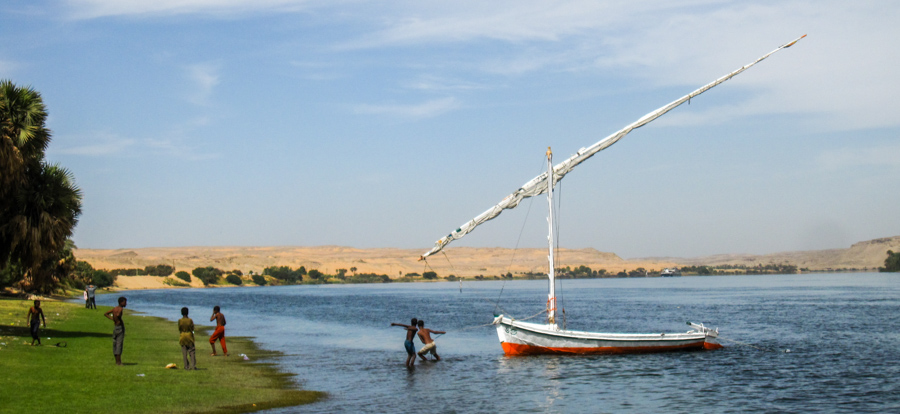
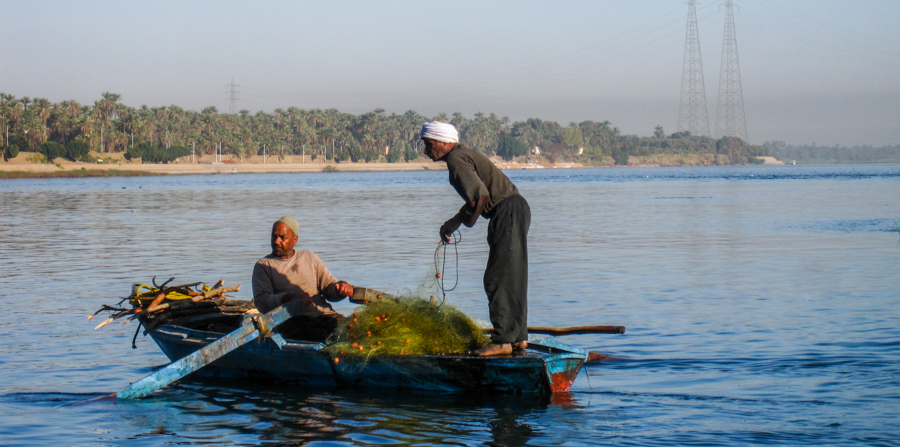
As we disembark we are picked up by a friend with a microbus whom we convince to take us to a nearby Camel market - the second largest in Egypt, I believe, other than the large one outside of Cairo. "Not for the squeamish, or PETA types." Indeed. Still, beautiful in the chaos of the system.
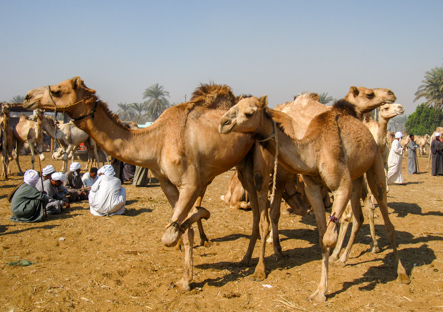

Next stop on our impromptu microbus tour (en route back to Luxor) is the Temple of Edfu, which at first glance is nothing special after a dozen similar temples (one does get templed out, similar to churched out in Italy). But then you slow down, somewhere underground, to think about just where, exactly, you are.
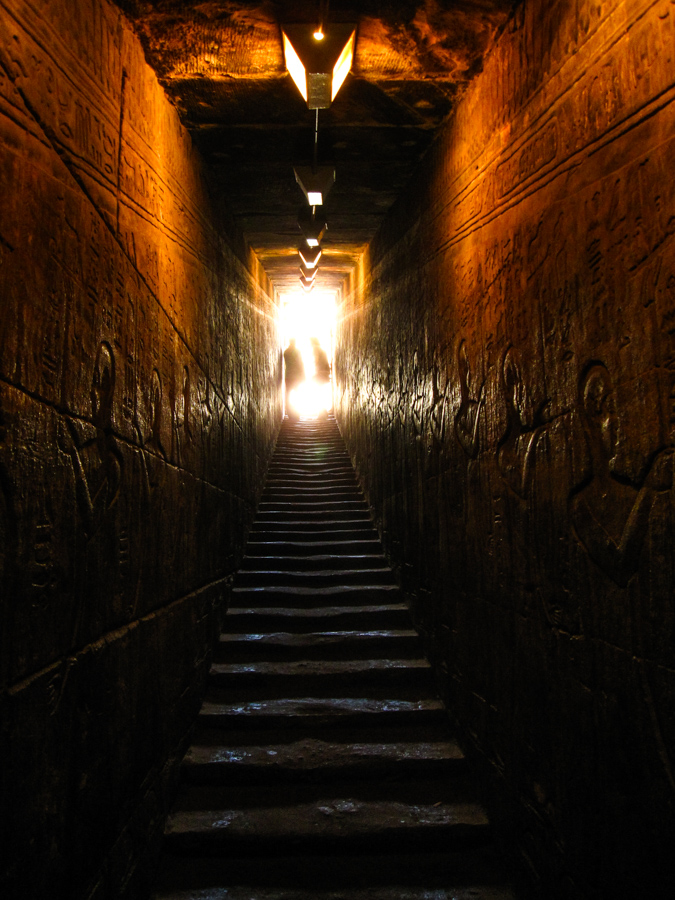
After saying farewells to the felucca group I don't stay the night in Luxor, opting instead for an immediate overnight bus up to Suez. Which, unfortunately, arrives just early enough for me to get ripped off by a taxi getting out of the bus station and, fortunately, just in time to watch the first container ship glide through the Suez Canal at sunrise.
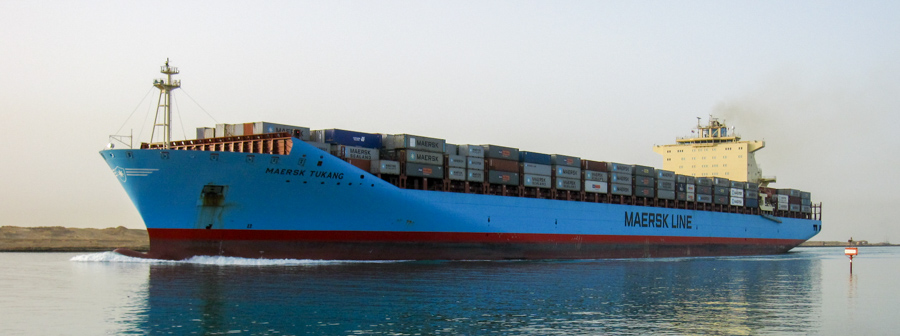
Not bad - I'm a bit tired though, and only hotel I know of is closed when I knock at 5am. When they finally do open, I crash for a quick nap. Later, watching the sunset, I befriend a big group about my age picnicking nearby. After hanging out for awhile they propose a coffee, or somesuch, and I drop my wariness as the group includes women - no Egyptian scam could possibly involve women. As we are leaving the group dissolves and pretty soon it is just me and four guys walking away - to get stopped, within ten seconds, by plain clothes police officers (pistols stuck in the back of their jeans), demanding identification cards from all the guys, writing down their names on a list. "Just for my protection", the guys tell me. Of course the police speak no English. They demand my passport - but I've conveniently left it at the hotel, ish. Immediate flashbacks to Assyut - the government really doesn't like locals interacting with tourists.
All in all, this does get me a bit worried, and by the time the coffee plan changes to "come see where I work" in some sketchy office building, I am once again paranoid. The workplace appears to be some sort of timeshare selling scam (targeted at Egyptians), it is a big room filled with tables where sales people are selling who knows what while techno pumps in the background and free drinks go all around. I almost refuse the chai - who knows, maybe this is a 100 euro cup of tea I'm accepting. But, I don't, and it's not. So it turns out well, even if I do bail as soon as possible and have unfortunately forgotten the name of my hotel (I'm queried over and over again, though I just point in a vague direction). I don't think tourists come to Suez. I'm screwed on the taxi to get back to the bus station when I leave. Suez wasn't my favorite.
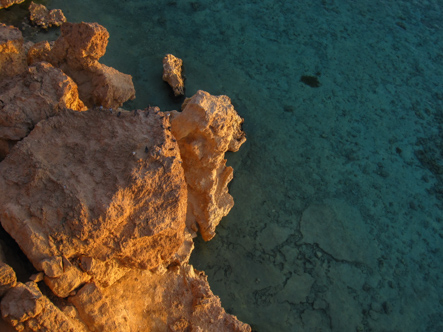
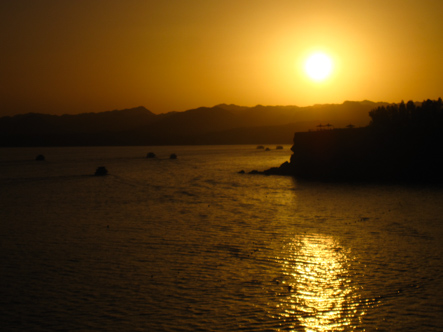
Sharm el-Shiek, on the tip of the Sinai peninsula, is a different story. Almost always avoided by backpackers, because it is "package tour land", home of all kinds of tourist ridiculousness, I nevertheless make a stop for a night. The local youth hostel, which looks like a palace (it has a chandelier in the giant reception - I refuse to get out of the taxi, not believing that he has actually taken me to the hostel, until he walks me in) is filled exclusively with Egyptians. Budget travel I suppose. Sharm, itself, is absolutely gorgeous, but the main beach is also segmented off into private little sections with admission costs and loud music. And, Russian girls dancing in thongs. Apparently most Egyptian guys think Sharm is heaven on earth because they can come here and see girls in bikinis. At sunset, all the diving boats returning to harbor.
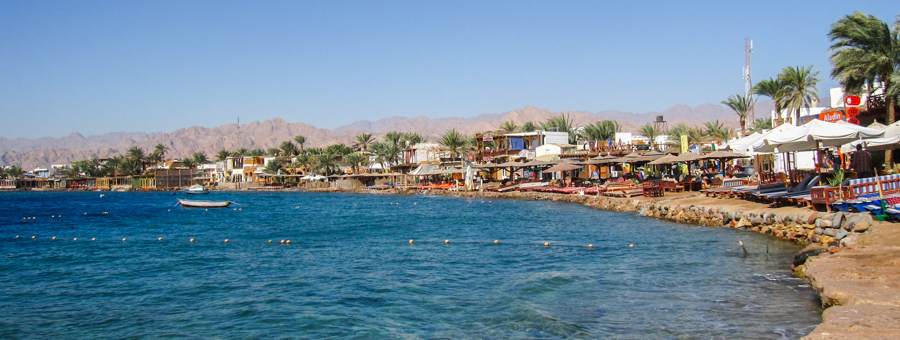
Oh, Dahab. Above: the beach scene. Below: one of my many chillout spots.
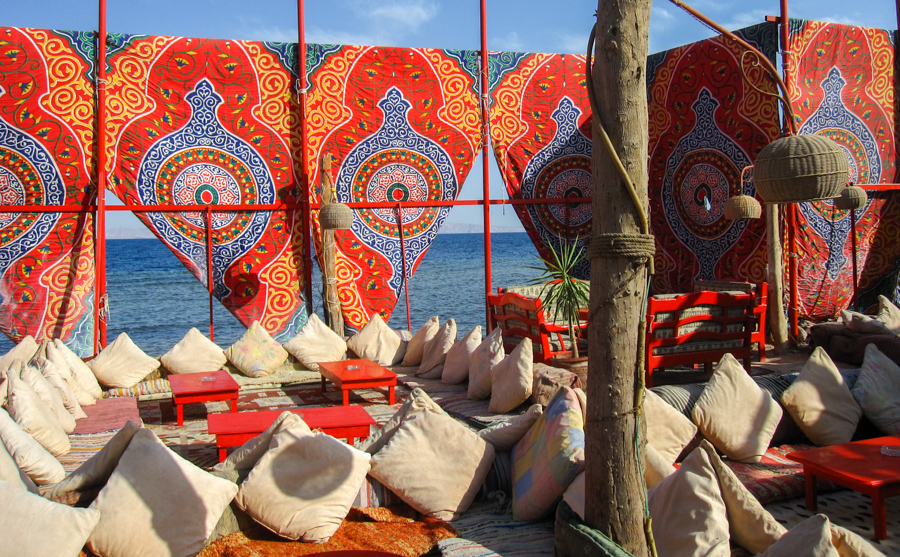
I spent 10 days, plus or minus. Doing what exactly, I'm not sure. Of course, this is the thing to do, "get stuck" in Dahab. I do manage to learn to scuba dive, getting my Open Water certification (down to 18m, which feels pretty dam deep when you're looking up at the surface). Though, this only takes four days. On either side my time is spent reading, getting sunburnt, drinking milkshakes, eating delicious breakfasts, etc. Standard Dahab fare. I do make it out to a sunset trek past Saint Catherins' Monastery and up to the top of Mt. Sinai. Some biblical significance, but I can't help with the details there. Gorgeous scenery.
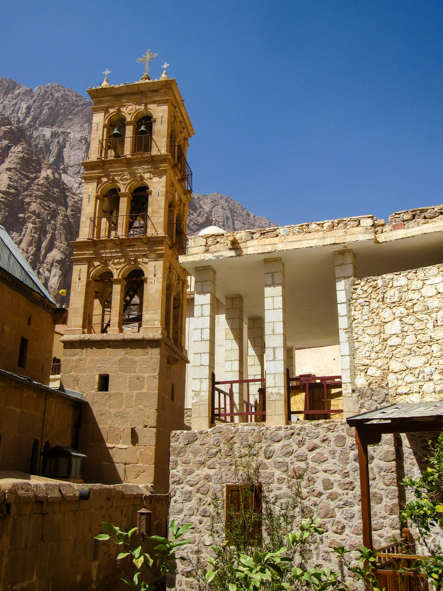
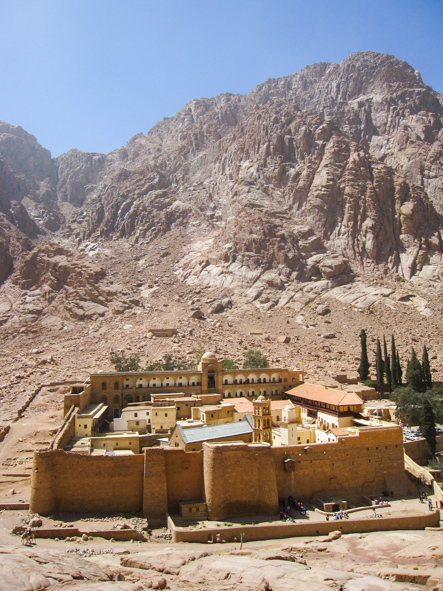
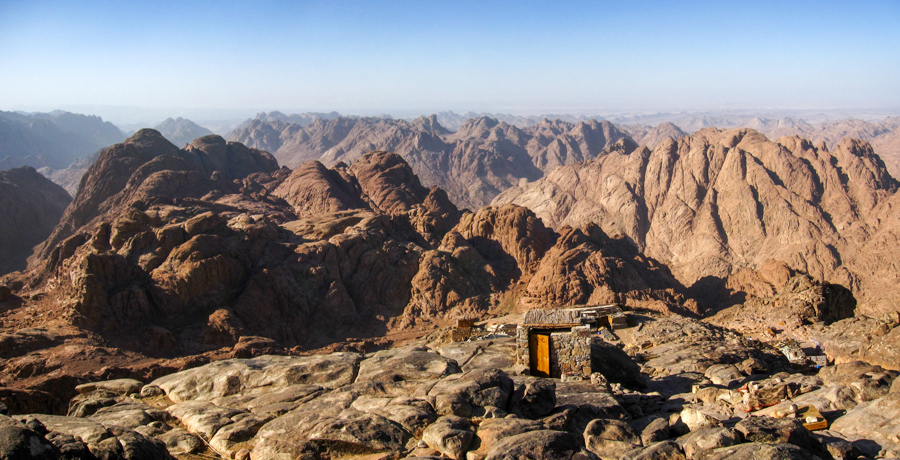
Part of my procrastination is my cute British dive instructor. A bigger part, though, is that the day I leave I'll have to figure out the ferry and cross, finally, into Jordan. It feels just like leaving Greece for the unknown of Egypt. Now, Egypt seems like second-nature to me, I am comfortable getting around and know, as much as a tourist can in 7 weeks, how things work.
Jordan, though, is an unknown.
Jordan
on Mar. 24, 2009
Another reason for my procrastination when leaving Egypt - I had overstayed my visa. At worst, deportation (I thought it unlikely). Second worse, the demand for a letter of apology from the US embassy (also unlikely, though the book says it is a requirement). At Nuweiba I do my best hello+smile at the border official who has been smashing exit stamps in passports all day long in a never-ending queue, hoping perhaps he won't just notice. No such luck. He frowns at it, at me, at it, and then sends me away, over to some little office. Inside they frown at it, then at a calendar, ticking days off on their fingers. More frowning, and the shake of a head. No good. They scrawl something on the back of my exit slip and tell me to head to some other office, outside the border control zone. This is the real deal, I enter and am the second person already inside. "What are you in for?" I joke, but get no reply from the other captive. I cross my legs and get shouted at by the military guy behind the desk to put my feet flat on the ground. Oops.
Now, I have carefully prepared two excuses. The first, based on ignorance, is saved for second. The second, based on technicalities (i.e., if "a month" actually means 31 days, and a "two week grace period" actually exists, then I may be, plus or minus 24 hours, not actually over my visa). The guy behind the desk finally grabs my passport, and pulls out his own calendar. After a minute of consultation, he makes it quite clear what is going to happen. "You stay too long. You pay fine, and get on boat. No pay fine, you leave [the port]". The fine is only 155LE, fifteen euros, and I don't even attempt an excuse. It is now 2pm.
During the next three hours I wait for the "fast ferry" to depart, and make the acquaintance of Anna and Matt (the Kiwis), Jason and Kellie (the Aussies #1), and Jason and Mymy (the Aussies #2), my traveling companions for the next week or two. At 5pm we finally get on the shuttle out to the ferry. By 8pm the ferry is in motion, we think. By 11pm (after the "two hour ride") we arrive at immigration in Aqaba, Jordan. By midnight, on the other side, we begin to hear a deafening roar which turns out to be a literal mob of taxi drivers, who have waited all night to fight over the few tourists which appear. Long story short, we arrive in Wadi Musa, the town just outside Petra, around 1am, and crash at the first hotel that will have us.
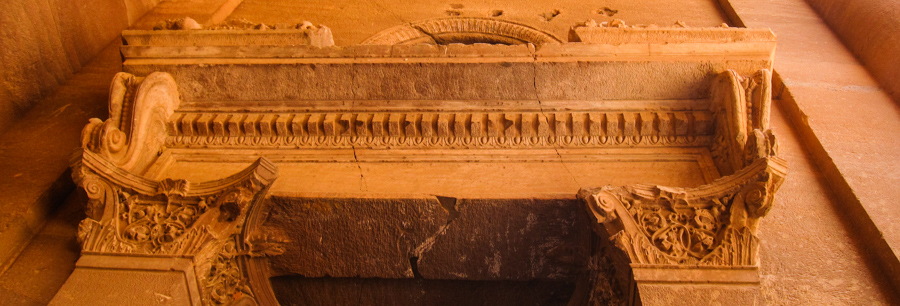
Petra is nothing short of amazing - I spend two days just hiking around. After negotiating the kilometer long entranceway valley, twisting through the multicolored rock, you are greeted by the Indiana Jones site itself, the Treasury:
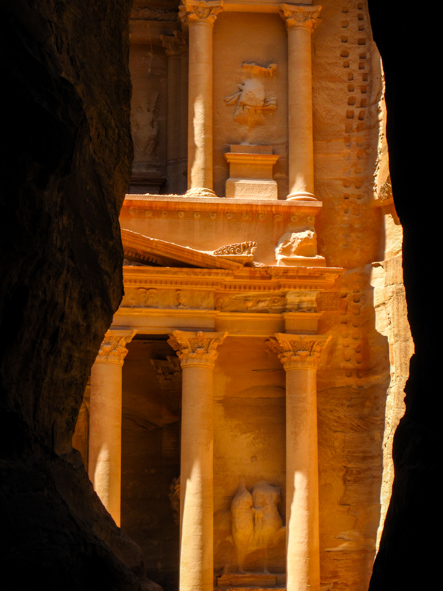
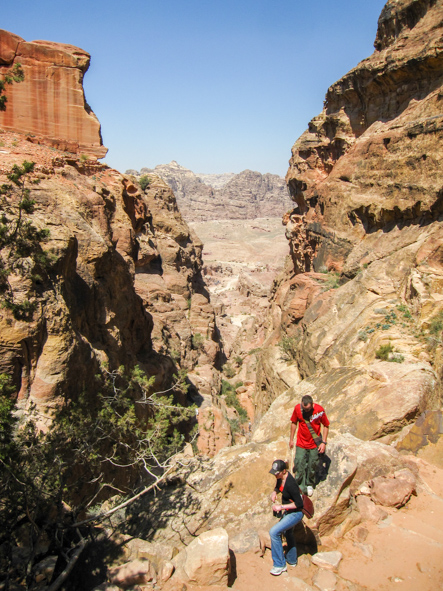
Another awesome sight is the Monastery (it should be said that there was no treasure in the Treasury, and whether or not anything religious occurred in the Monastery is questionable).
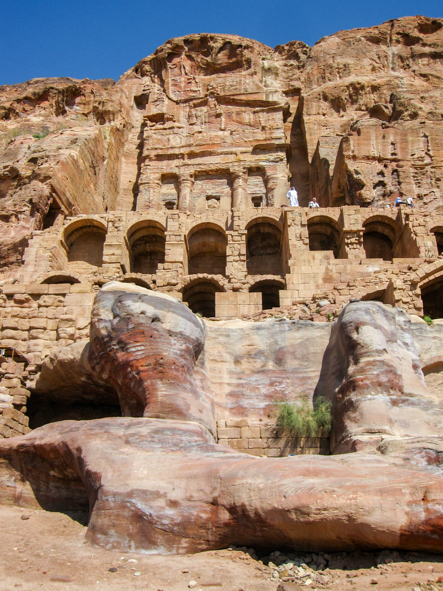
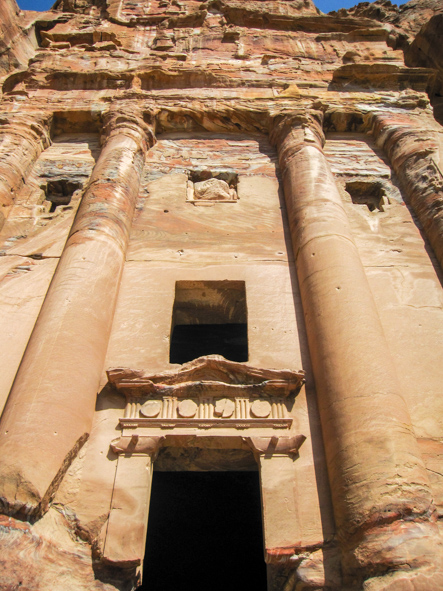
We are told about an awesome hike through a flooded valley, and we set off to find an incredibly narrow gorge, barely wide enough at times to fit through, filled with pools of murky water, of unknown depth though some definitely containing random shards of metal and other nasties. It is a mad scramble, bracing hands-outstretched against the walls on either side and trying not to fall in. My favorite part: a sandy rock face slanting down towards a 2m drop into water, with the advice "let go, slide, and just before you slide off the edge, jump." It is instantly one of the most fun times I have had hiking on this trip, and makes me want to go rock climbing when I get back.

Saying goodbye to Petra the seven of us agree to a tour down to Wadi Rum ( وادي رم ), the desert in Southern Jordan. A short bus ride and then we are separated from our bags and piled into jeeps (one of which requires all the tourists inside to get out and "push", one of two English words the driver knows, in order to get it started) to cruise around in some gorgeous landscapes.
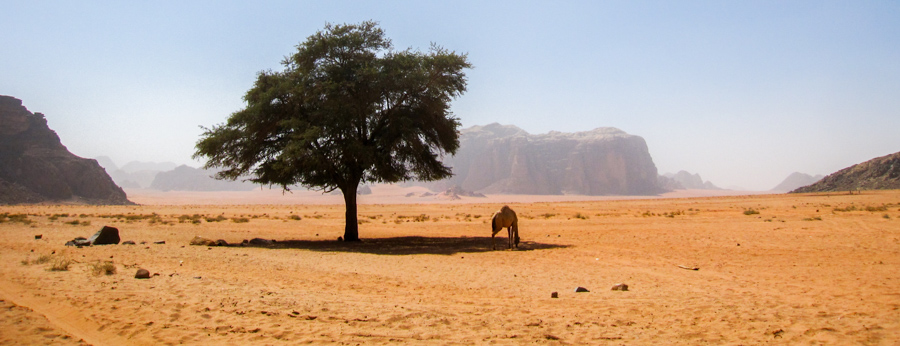
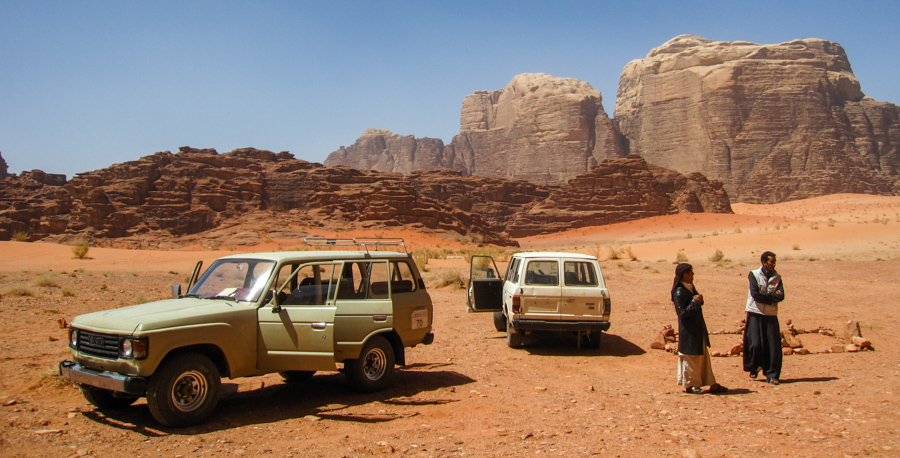
Everything is red -- this is the red desert. The sights include the house of Lawrence of Arabia, though we get into an endless debate about whether it was his real house, or the house used for the movie (filmed on location, here). Another spelunking adventure... good, sticky shoes a real necessity to avoid any unexpected slides into a crevasse.
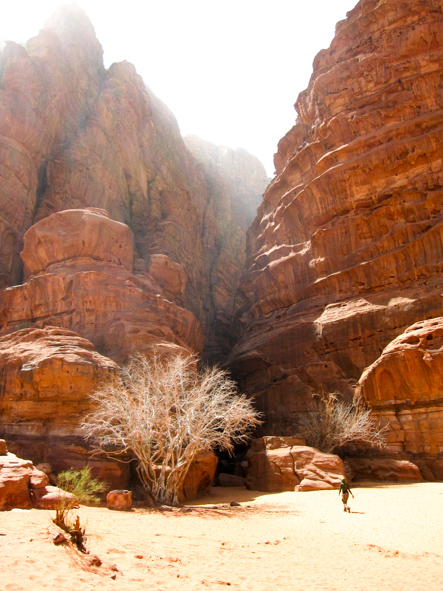
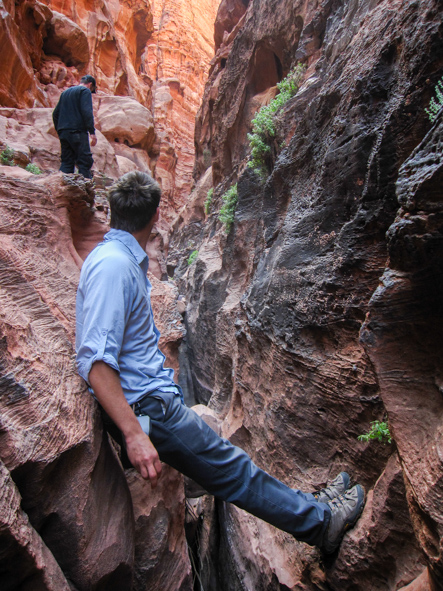
We spend a night at the Meditation Camp in the middle of the desert, complete with a unremitting supple of rosemary Bedouin tea and food cooked underground and dug up to eat (only a little sandy). The view from our camp, out across the plain:
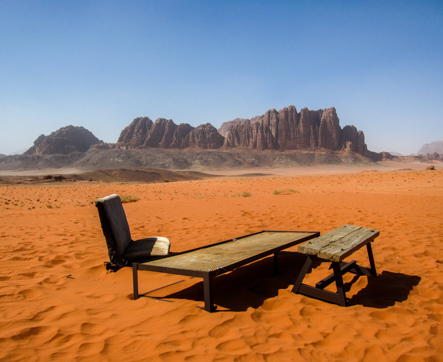
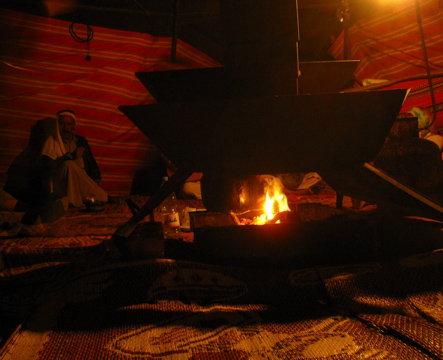
We ask where the best place to watch a sunset is, and get directed up to the top of a mountain. The descent/scramble as the light fades was a bit tricky, but worth it.
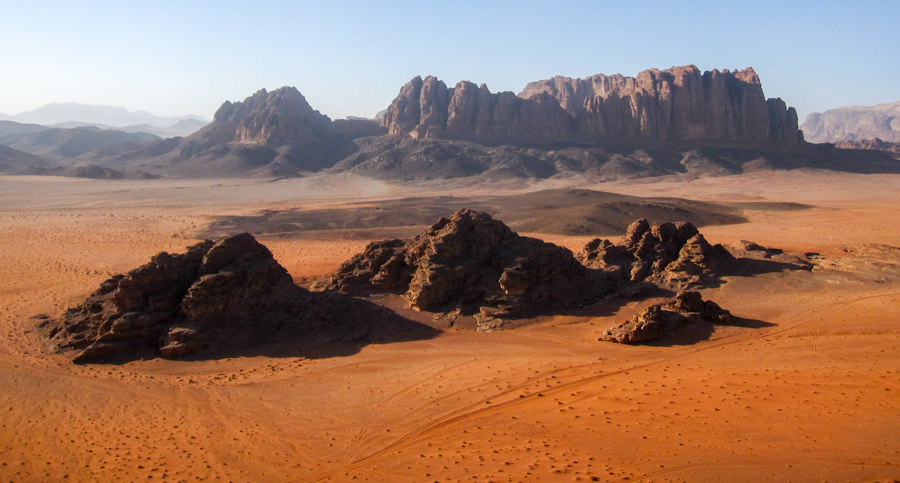
To leave the desert we are at the mercy of the bus cartel (rather, the single bus that operates between the highway and the camps). On our way in we ask about just getting transport to the highway, instead of all the way back to Petra, and get some dirty looks, and the bus for tomorrow is suddenly full (just for the three of us that asked). The others, no problem. We try to bribe a jeep driver to take us out to the highway, but no dice, and we end up back on the [not full] bus. He vows that catching a minibus on the highway is impossible, today, at this time, for a million reasons. There is one waiting there for us when we arrive. Of course, he takes us only to "ma'an", instead of "amman", and we get into a little tiff about the money, but it all works out, and soon enough we are in Amman, the capital. In the environs, first, to the Roman ruins of Jerash.
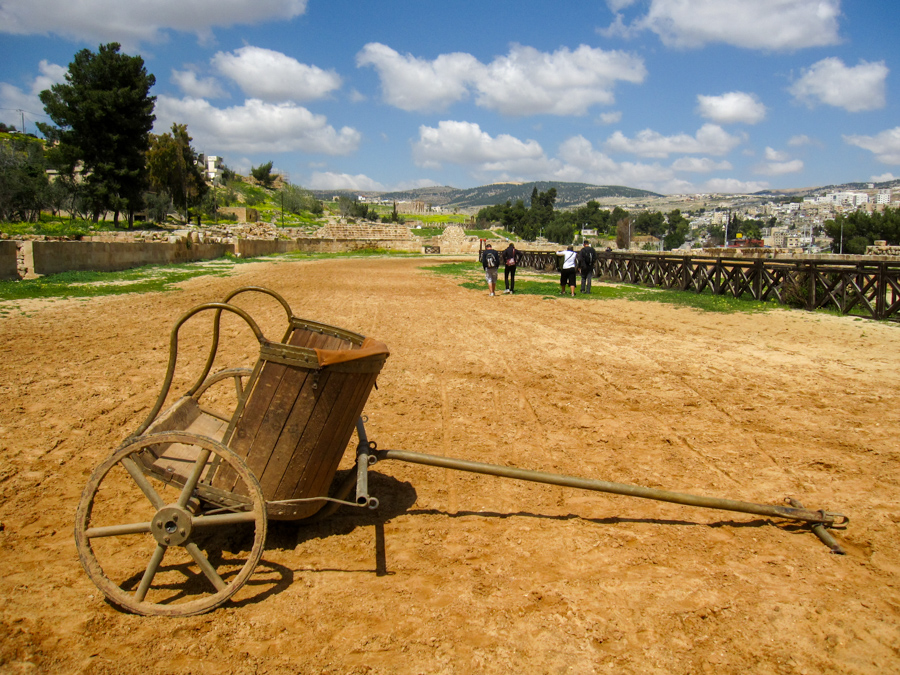

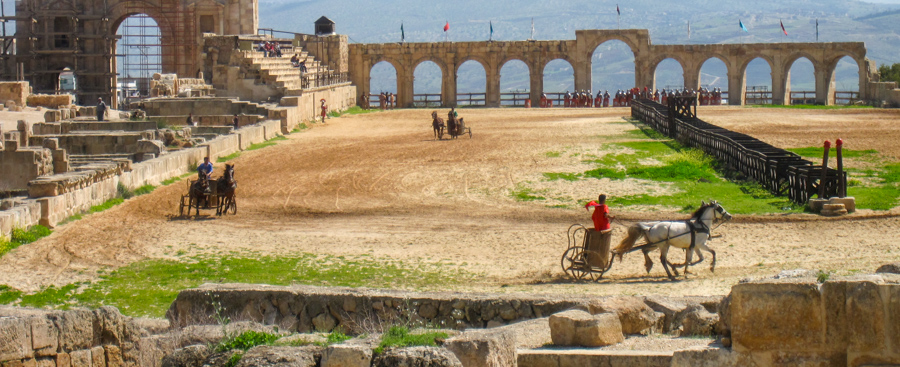
And yes, they do a full recreation of Roman chariot races and infantry marching and battle tactics. When at least thirty guys marched out, accompanied by three horse-drawn chariots, I have to admit it was all rather impressive, at least from the distant hill where we were watching for free.
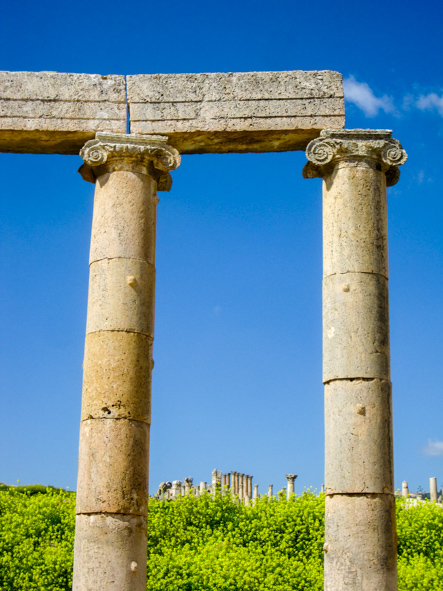
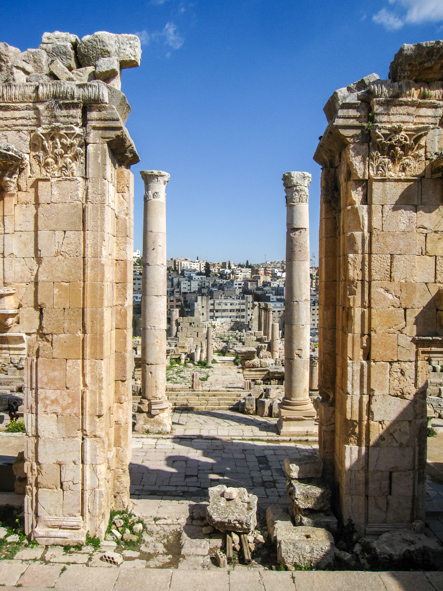
The next day, we call up a taxi driver whose number we have acquired, who agrees reluctantly to illegally take the five of us for the day. Jordan is no Egypt - things are crazy expensive, and rules seem to matter. We are often refused for taxis when there are more people than seat belts. We hit up the Dead Sea for a quick swim, mud slathering, and view of Israel, before heading to a nearby hot springs in the mountains to rinse off, and cool off.
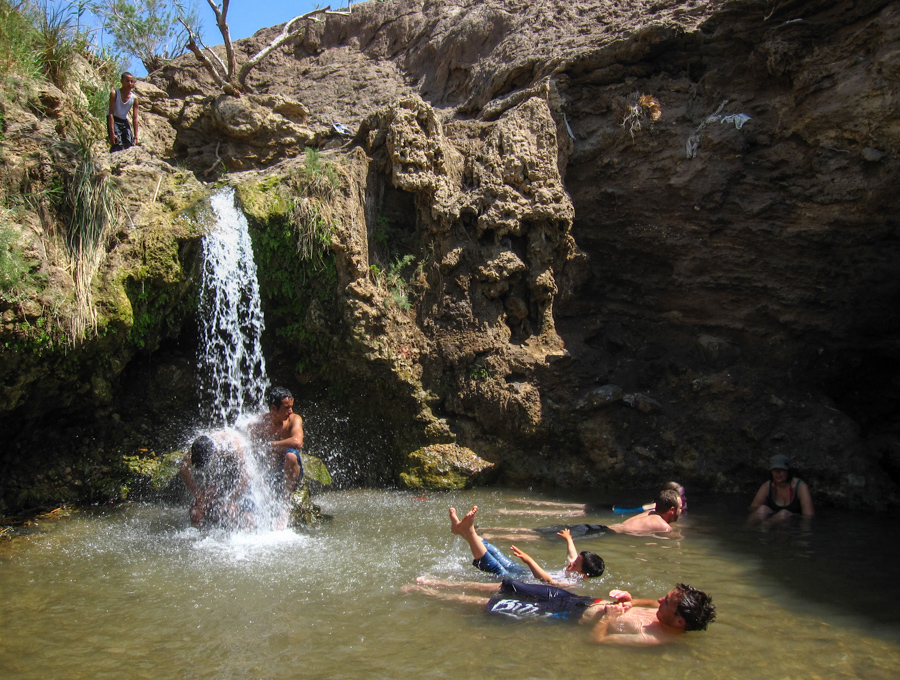
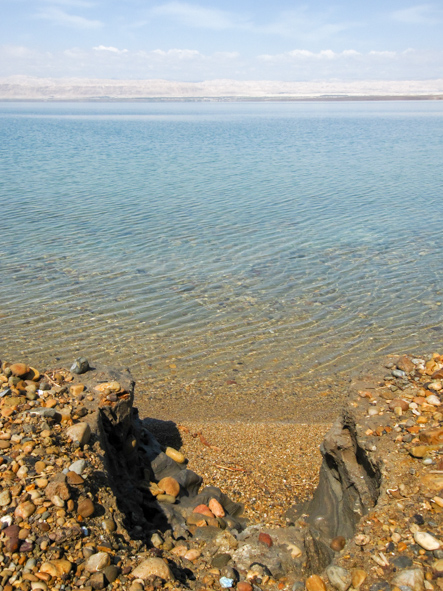
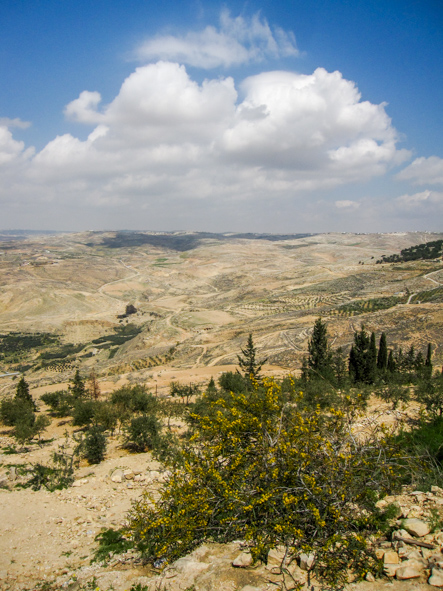
Lunch is heat of goat, in a definitely authentic, locals place. Finally, we end the day atop Mount Nebo, the place where Moses viewed the promised land (Canaan). Moses was buried here? Opinions vary. Visited by Pope John Paul II recently.
All in all, a good day, though I can't say I'm looking forward to tomorrow. In our hotel there is a Kiwi girl who has just returned from the Syrian border, after being denied entry, which doesn't exactly inspire confidence with my passport from the good ol' USA. Still, as I've gotten closer every person I've met has had nothing but praise for Syria, and now I am really hoping I get in. The backup plan, if I get rejected, is the otherwise forbidden Israel (only one of the two allowed, stamps in the passport, after which the other will deny entry), and then a hopover flight to Turkey. Hopefully it won't come to that.
Syria :: Damascus
on Mar. 31, 2009
Why does Damascus get its own post? A really amazing city. And I got in. Now that the surprise is spoiled, to backtrack.
We take the cheapest possible way to the border - taxi service to the bus station, a local bus to Ramtha (the "old" border), and another negotiated taxi service across the border to the nearest Syrian town. Our taxi driver asks for nationalities, and isn't pleased that I am American, but I know the drill. I assure him that he doesn't have to wait for me, only get me to Syrian border control. We pile in (illegally, five) and roll out of Jordan without incident. Our taxi screeches to a halt just after passport control and just before the final checkpoint on the way out to buy a few cartons of cigarettes. He rips open the box, stuffs the cigarettes under the seat and in the glove box, and tosses the box into a dumpster as we speed off. The entire dumpster is overflowing with empty cigarette carton containers. The two members of the Jordanian military, wielding ridiculously large guns, who check out passports on the way out smile and laugh at me (only me). It is the two couples in the backseat, and me in the front, backpacks piled on top. Where is my wife, they want to know? Is the driver my wife? They think so, and find this quick funny, as do my companions, me not quite so much, but this is no time not to smile. We speed off and look back, the military guys are bent over, crackling up. So much for the stoic facade.
We cross no man's land, a few kilometers of winding road, before reaching Syrian border control. There, the Aussies (with visas obtained, dutifully, at home) are stamped in without question. The Kiwis are sent on a five minute walk to the "bank" to buy their visas, and are then waved in. I hand over my passport, retrieve my bags from the taxi, dump them on the floor and take a seat. We set a rendezvous at a hotel in Damascus, and with that I am left alone - good thing I brought lunch. Five hours later, during which time I do not ask a single question about what may or may not be going on, I am waved over by an official who tells me that I now, too, can walk to the bank and buy my visa.
The irony? For Americans, a Syrian visa is 16 dollars. For Kiwis, 60-something dollars.
I am surprised that there is no interrogation. In fact, I am never asked a single question, about why I am here, about why I didn't have a visa in advance, about any potential visits to Israel. I had been told that they might even look through your luggage for evidence of an Israel trip, such as ticket stubs or Israeli sections highlighted in a guidebook. No such drill, and although it may be official policy that a visa must, absolutely, be obtained in one's home country prior to arrival, reality is a bit more relaxed.
I hijack someone else's service taxi on their way through, and am brought for free to the local bus station. With my newly acquired Syrian pounds, courtesy of the border bank, I buy a ticket for Damascus, and a few hours later arrive at Hotel Al-Amin where I am reunited with the traveling buddies. That night, some wanderings through the bazaar, one of the most fascinating places I have been yet on this trip. Anything you could want, sold here.

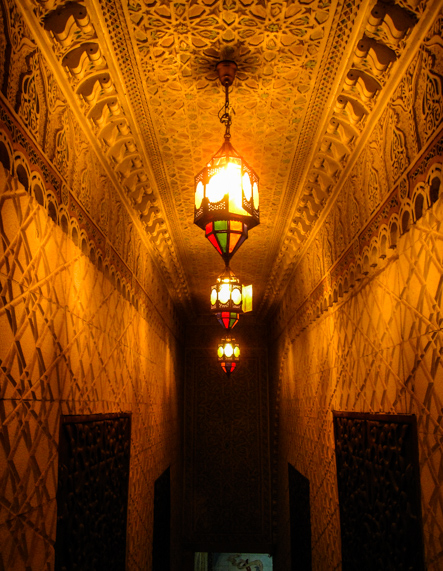
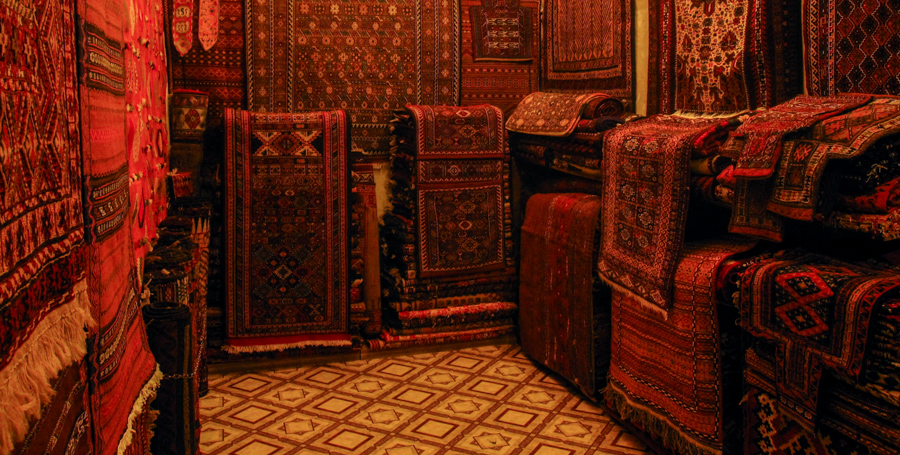
The Old City in Damascus, for once, entirely lives up to all expectations. And, there are no tourists. Everything here seems to cater to the locals, and we are more or less treated as such (or ignored) everywhere we go. The architecture and, more than that, the character of the old buildings and stores, is truly unique.
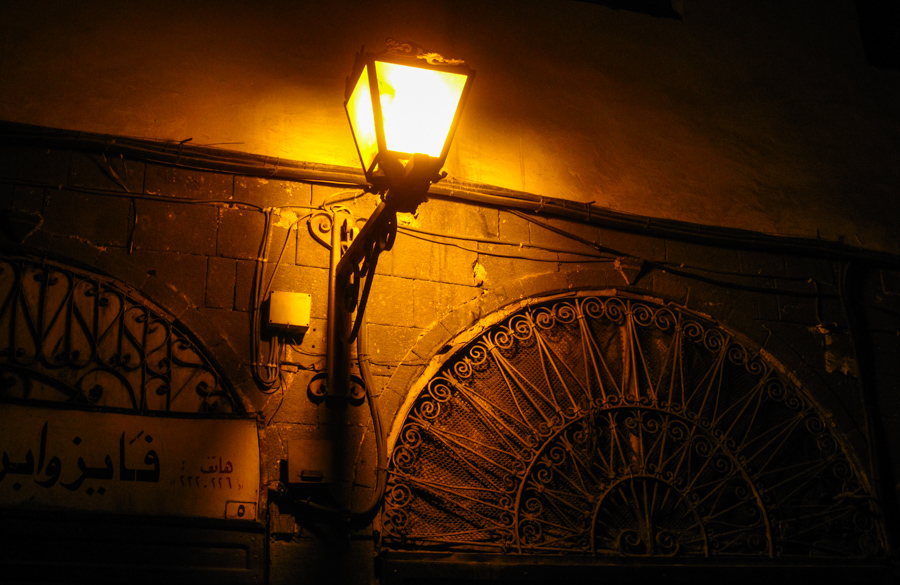
So there is also a bit of the modern, my "Neon Mosque." But, the call to prayer still draws everyone, all the guys crowding inside, those that arrive too late lining up outside on rows and rows of flattened cardboard boxes.
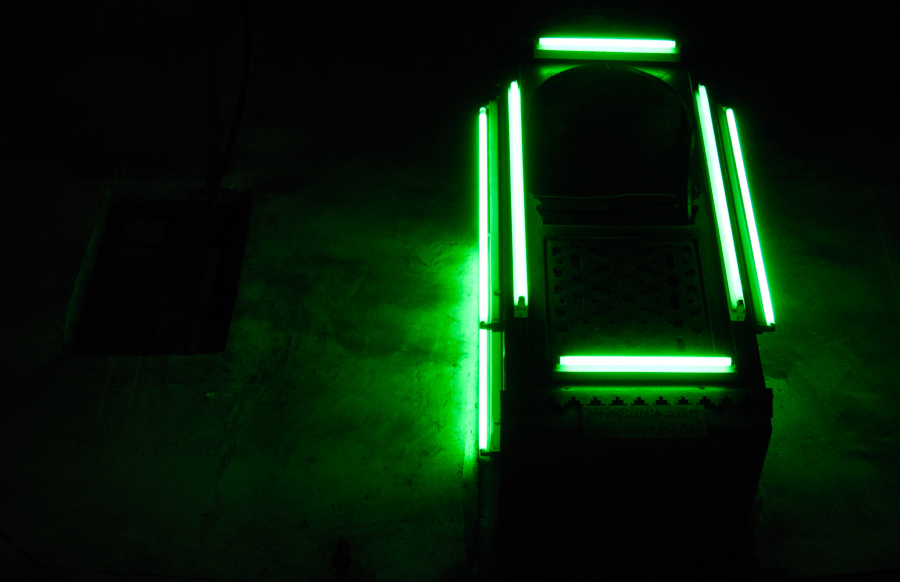

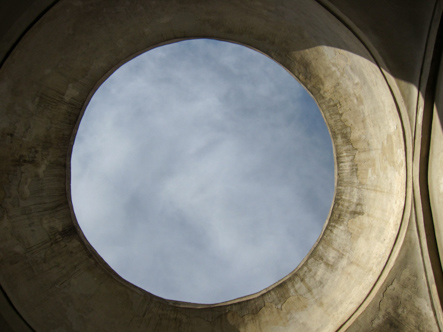
And, our hotel is filled almost exclusively with Iranian families. It is a big month-long holiday in Iran, and a favorite place to come is Syria. All it takes to make some friends is to sit down in the living room, accept a glass of chai, and make a few attempts in the Arabic I've picked up in Egypt. So the conversation doesn't last very long, but you are already an accepted part of the boys club, welcome to idle away the evening. Assuming, of course, you're a boy. I'll forego here any cliche observations on women in a conservative Muslim society - perhaps later.
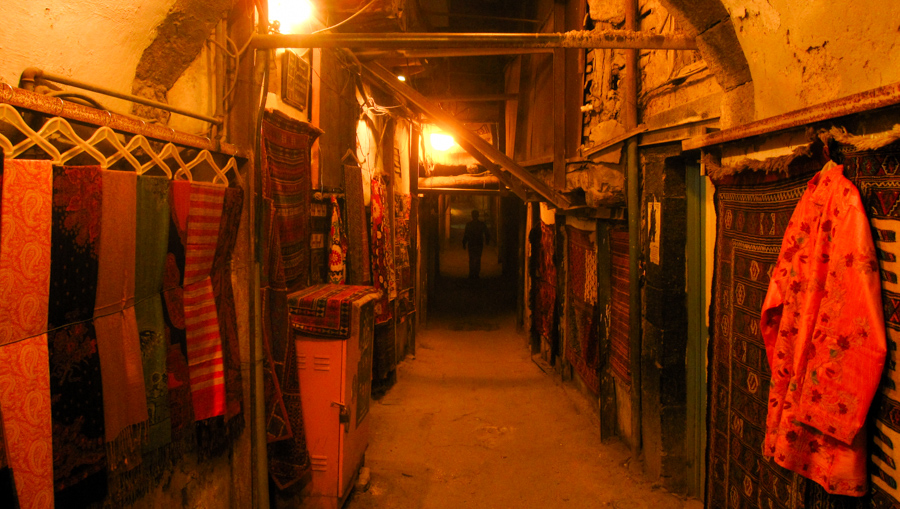
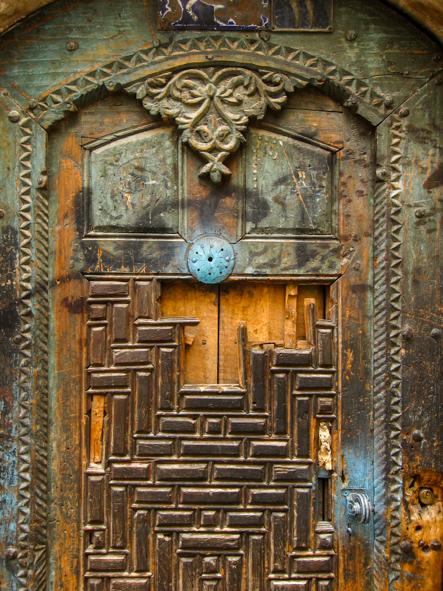
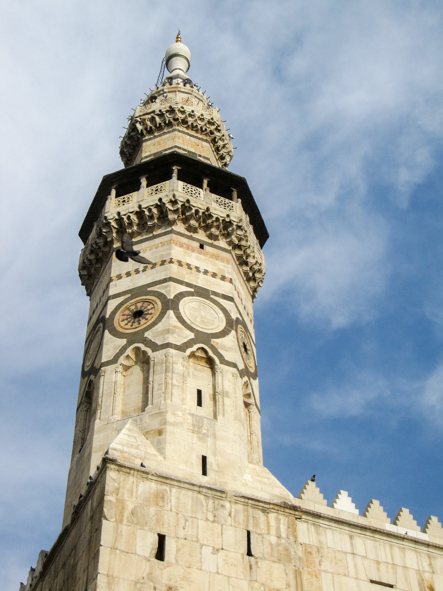
Old doors inscribed with Islamic geometrical patterns. Night market alleys in the old streets of Damascus.
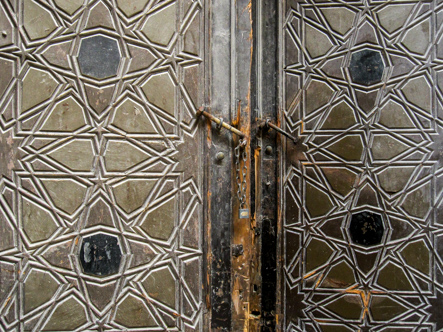
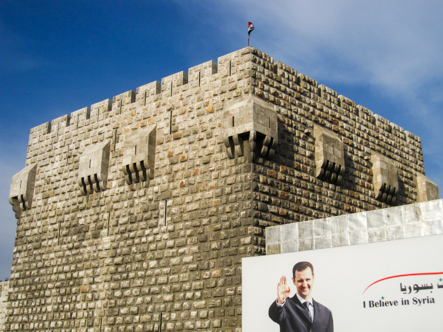
Bashar believes in Syria. As taken in 2009, rather hopeful. Ten years later, crushing.
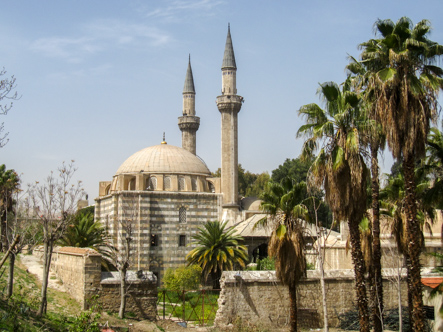
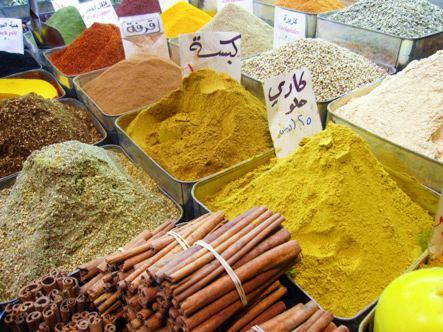
And, the food! People have said that the food just gets better and better as you go North, from Egypt, Jordan, Syria, and finally Turkey. Jordanian food was good. Syrian food is amazing. (For the record, and said without any prejudice and only good memories, Egyptian food is crap, in retrospect). Right next door to our hotel is a guy that sells scoops of ice cream for 5 pounds (50 SYP to the dollar). World famous pistachio ice cream is available in the bazaar. And, we locate the world's best kebap.
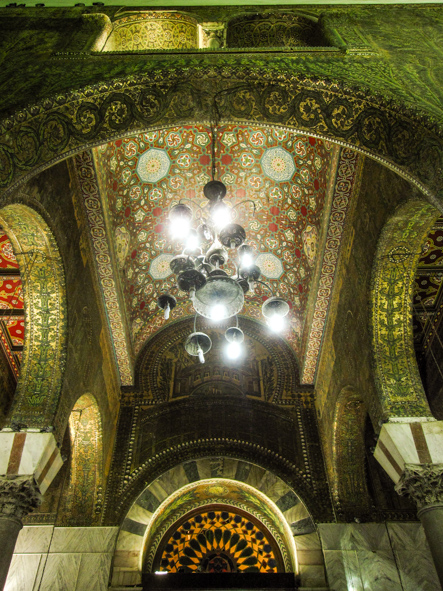
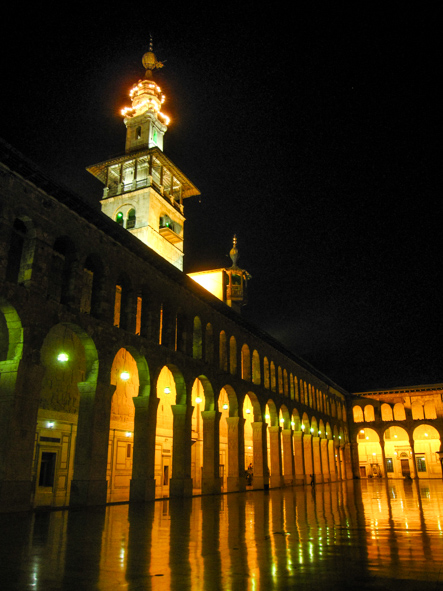
We stroll by, on accident, and at twilight, a Mosque, and I glance inside. It is one of the most beautiful things I have ever seen - and when we get back I pull out a map and vow to return the following night at sunset. Well, two nights later, we make it. The Umayyad Mosque, also known as the Grand Mosque of Damascus, lives up to its name. One of the oldest and largest in the world, and the first mosque a pope ever visited (in 2001, tin pilgrimage to the head of John the Baptist, contained within).
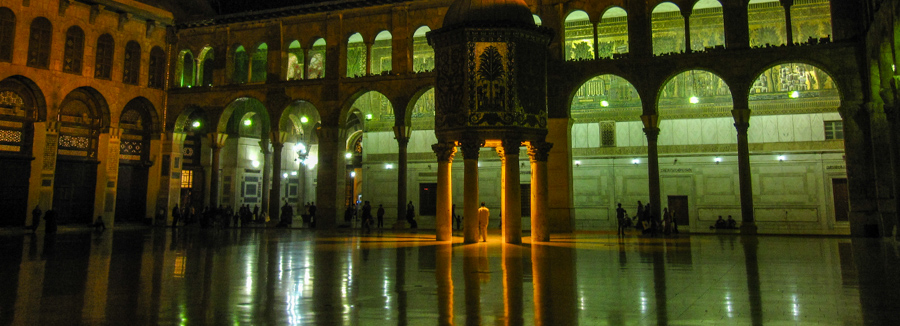
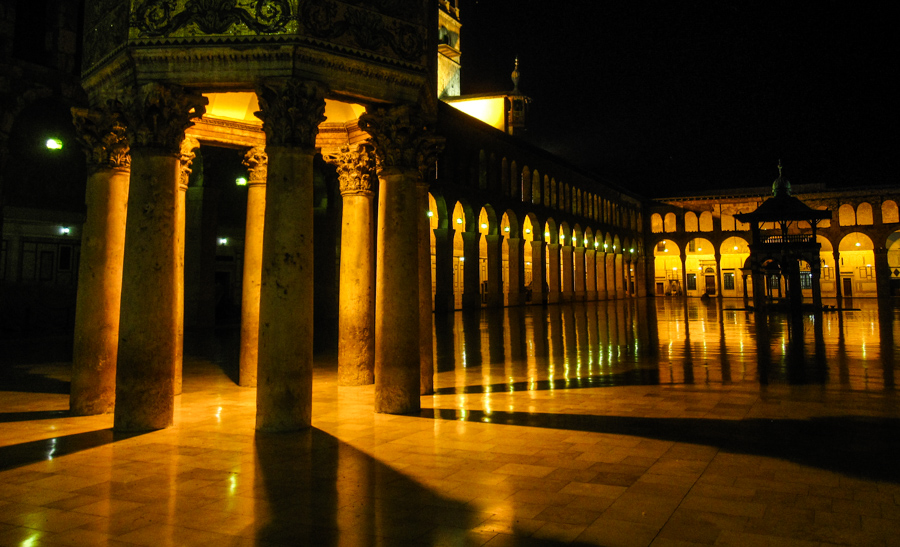
The next morning it is finally time to say goodbye to the Aussies and Kiwis, setting out on my own once again.
I veer East, towards the sea and into Lebanon, with the time to spare that they lack.
Lebanon
on Apr. 4, 2009
After paying my 500 SYP exit fee, I am happily granted a tourist visa for Lebanon for the reasonable price of 15,000 Lebanese pounds. On the bus from Damascus to Beirut I meet Manuel, a Cuban guy living in New York and working for the BBC World Service. When we arrive he whips out his cellphone and looks up the numbers of all his Lebanese friends, and we spend the next three days enjoying their boundless hospitality and exploring some fascinating parts of Lebanon.
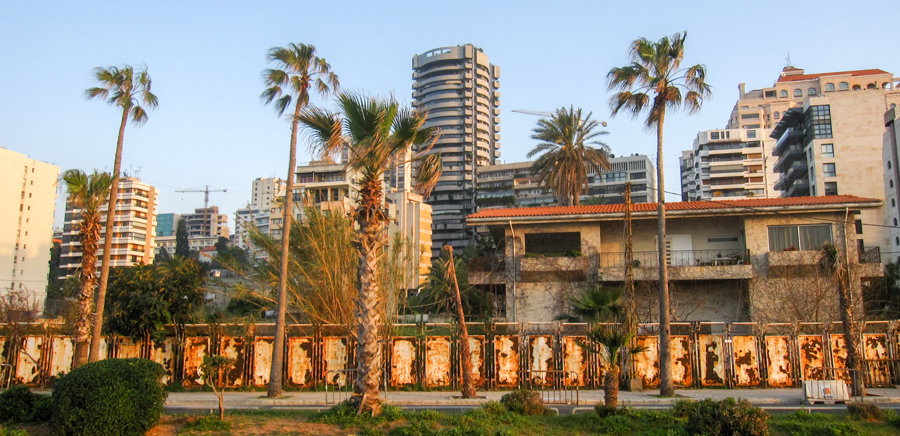
The country, coming from Syria, is quite a shock. Beirut is supposedly the "Paris of the Middle East", and as the bus passes a lingerie billboard-ad featuring a naked woman with underwear around her ankles I definitely get the impression that we're not in Syria anymore. Walking around Beirut I cannot quite believe the number of beautiful women, also walking around, showing hair, ankle, and in all manner of scandalous dress. I am basically back at home. Our first night we make it to what in Turkey is called a meyhane, a big restaurant where the drink and smoke flows freely, live music starts up sometime around midnight and shortly thereafter the whole restaurant is filled with dancing, clapping patrons. The Lebanese definitely know how to have a good time.
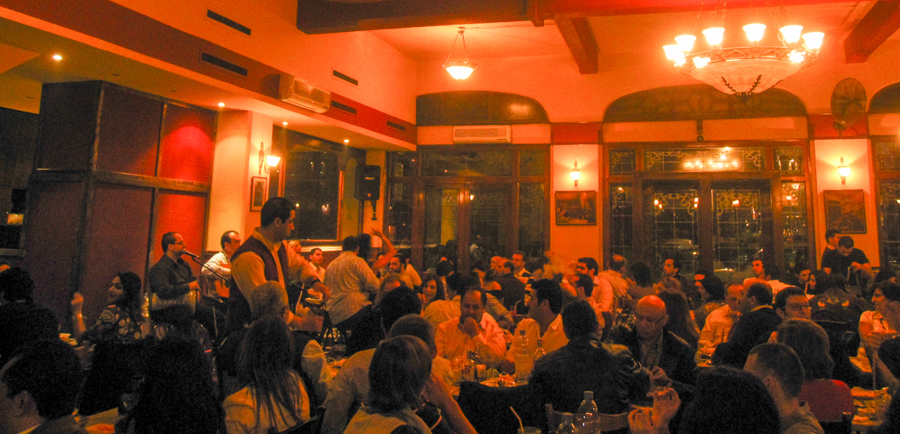
I suspect that having a good time is the escape from the reality which is much of Lebanon. I can't even begin to grasp the complicated history which is Lebanon, Israel, and Syria. Wikipedia helps. Conflict here has been recent though, as recently as May 2008, when Hezbollah "took control" of Western Beirut. We are told about the "war of the banks" where fighting progressed through downtown from one high-rise bank to the next. One still stands, full of massive holes from mortar rounds, amid brand new skyscrapers and dozens of cranes in the most active building campaign I have seen in any city. The statue in the main square, downtown, is riddled with bullet holes. The tension of a diversity of religions is omnipresent.
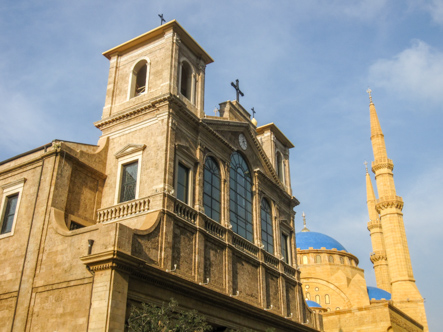

It is strange, the entire city is brand new, until you walk five minutes out of downtown and find entire neighborhoods of rubble. A work in progress.
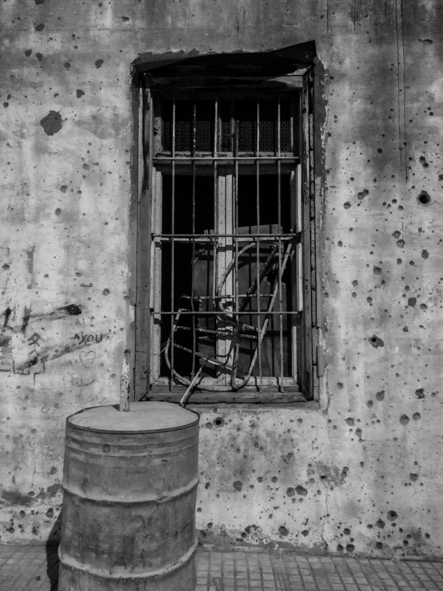
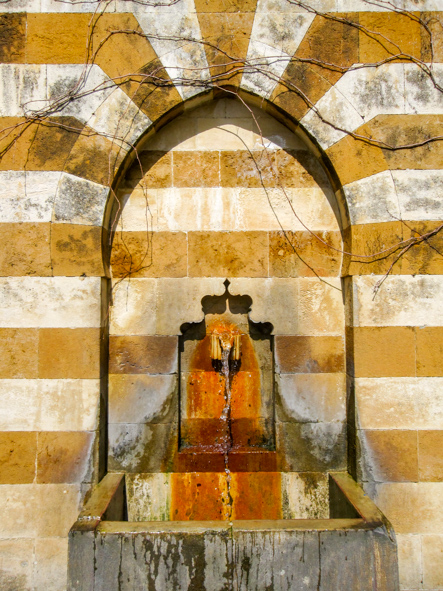
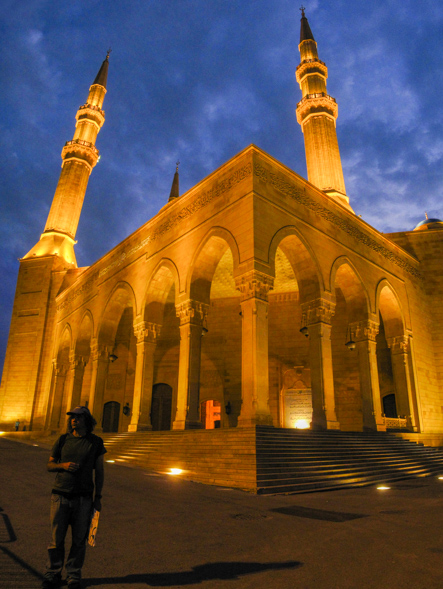
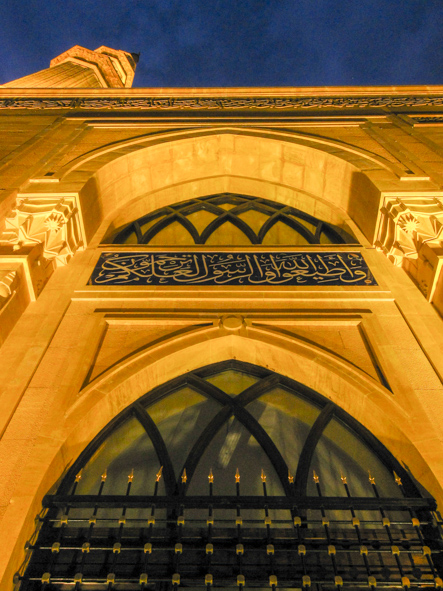
Where there has been progress, though, things are expensive. Beirut is easily as expensive as San Francisco, although there aren't quite as many Ferrari's or Lamborghini's as I was told to expect. Lebanon must be near the top of the list of countries where the rich are ridiculously rich (and the young rich need to show it), and the poor are ridiculously poor. Also, all the young people here speak English, even amongst themselves. French, second. Arabic, third. We discover, one night, the underground drag racing club on the sea-front highway, expensive cars doing donuts in the streets without a care in the world for police.
Which there are none. Only military. Lebanon is also the country with the highest military presence I have seen. Every major street corner is occupied by the military, and not just a guy with a machine-gun (like in Egypt), but a tank or two, with camo tarps thrown over it, guys on top manning some death-dealing contraption, with razor wire and those strange double X-shaped steel things which remind me of the D-Day landing scene in Saving Private Ryan. We are told that the military here is "actively targeted", mainly by Hezbollah. I get the definite impression that pulling out your camera anywhere near a military checkpoint is a sure way to get shot.
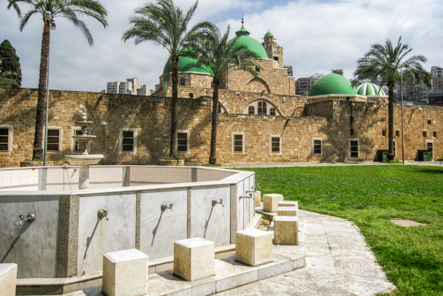
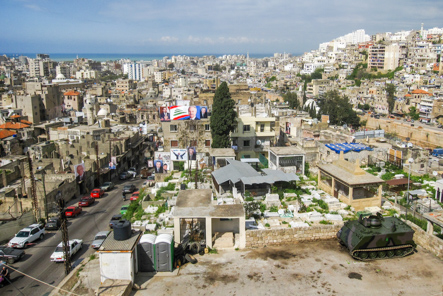
One of Manuel's friends, Nalia, takes us for a day trip up into the Chouf Mountains, where the majority of people are Druse, on whose wartime displacement she worked on as a thesis at Cambridge, only to have all her research stolen. Just as we are about to leave we pick up a third backpacker, an American guy, who Manuel knows from Jordan. When he jumps out briefly to get a jacket, Nalia confronts Manuel. She is convinced that he is an agent of Mossad, the Israeli Secret Police, here gathering intelligence about Southern Lebanon - an area which Israel has invaded numerous times. She apparently had such an experience before, having taken someone into the mountains and showed them around only to have them pull out military-grade maps of the region. This place is real. I almost wrote bizarre, but real is more accurate. Things that seem bizarre and ridiculous elsewhere are simply reality here. That said, we convince her that he is not, indeed, Israeli Secret Police, and after we meet a Druse family and he gets into a wrestling match with their 5 or 6 year old son she is obviously won over.
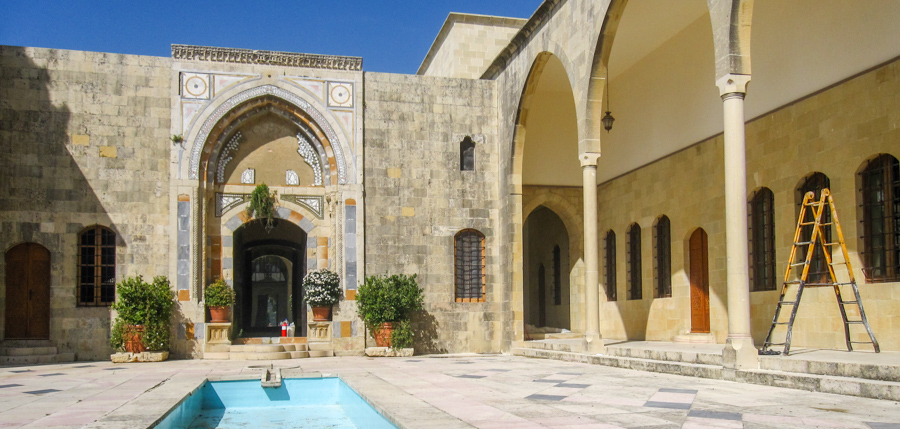
Syria was the first country I visited with an active U.S. State Department Travel Warning. Lebanon was the second. The U.S. believes that the most dangerous part of Lebanon is Tripoli, in the North, and that the Eest is relatively safe. Nalia says that there is nothing wrong with going to Tripoli, but that the valleys in the East are the heartland of Hezbollah, and she would never travel there. Information is only relative, I suppose. In the East, for good or bad, is Baalbek, one of the most important Roman ruins in the Middle East, which is deservedly impressive.
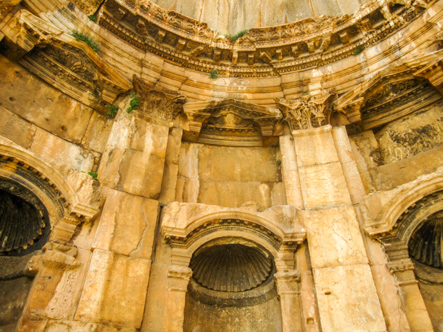
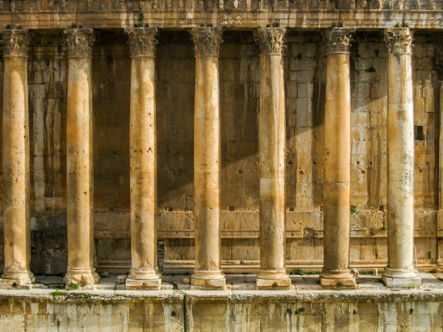
And, some guys chase after me trying to sell me a Hezbollah t-shirt. I don't think it would be wise to wear a t-shirt around covered in Arabic promoting who knows what, especially in Lebanon, Syria, Turkey, or well, anywhere. Shortly after, as I am trying to figure out how I am going to get back to Beirut, a rather suspicion looking minivan pulls up to me with two or three guys gesturing at me to get in. "Beirut?" I ask, and they nod. I jump in without a second thought - it's just how things work.
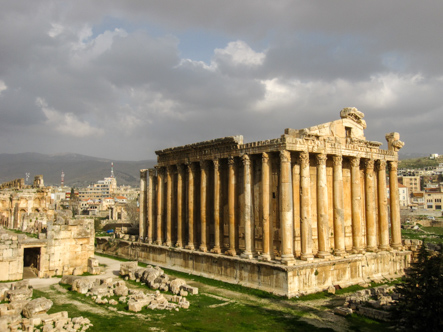
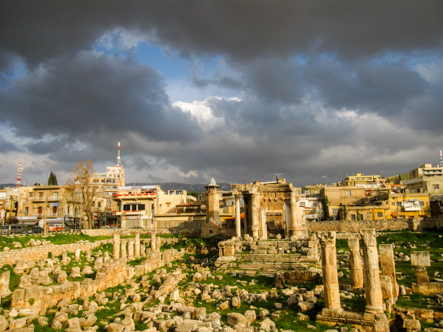
I also make it to Tripoli, where nothing at all seems amiss (there was a bus bombing in Aug, 2008), and reunite with Jason and Kellie, the two Aussies, for a night. The day trip is to the famed Cedars of Lebanon, up in the mountains. For me, they are a grove of trees surrounded by snow I have to walk through. Bsharri, the mountain village, is also home to the museum of Khalil Gibran (Lebanese, and born here), whose stuff I started reading at the beginning of this trip courtesy of mom, so I made a voyage to the quite strange museum. Strange man, I gather. Bsharri is beautiful, though, and it is ski-season here.
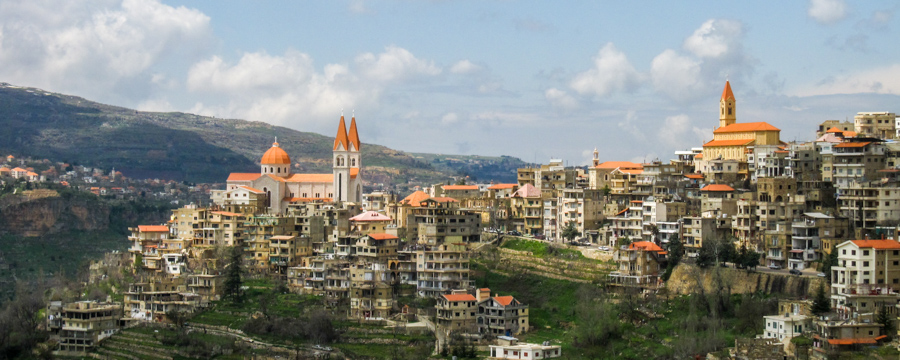
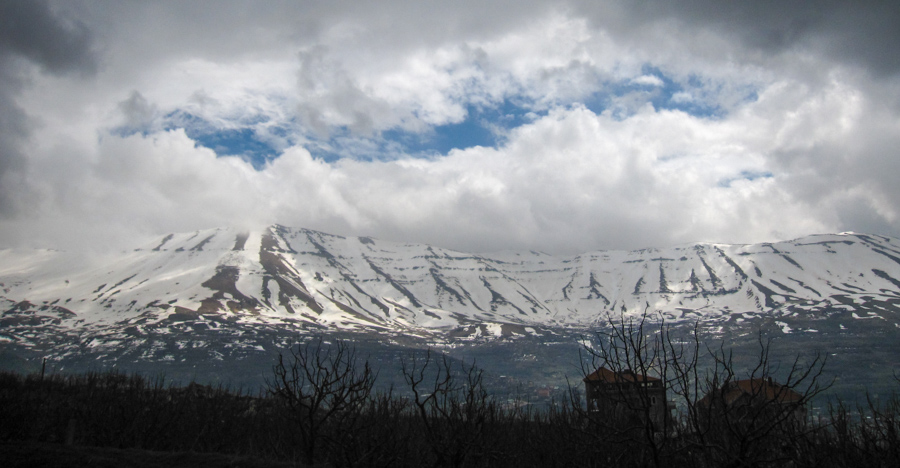
I could have stayed in Beirut forever (well, money aside), and it is now a contender with Damascus for the top place I would like to return to to learn Arabic. Decisions... but for now it is North, out of Lebanon, and back into Syria, for even stranger times.
Syria :: The North
on Apr. 9, 2009
I had hoped that the receipt slip from my Syrian exit fee, together with successful entry and exit stamps for the country, would expedite the process of getting back in for a second time. No such luck - I wait another five hours, and they don't like my choice of "Lattakia Hotel" in Lattakia. They list me off options where tourists must typically stay: "Sheraton, Marriot, ..." none of which I can afford. The third time they ask I catch on that they just want an acceptable answer, so officially I will be at the Sheraton in Lattakia. On the minibus to Lattakia I meet several Syrian guys, none of whom speak English, one who makes a point with his two hands. It takes me forever to figure out it is a roof - he is inviting me back to his house to meet his family. And probably stay. I decline, politely - I haven't become used to Syrian hospitality yet.
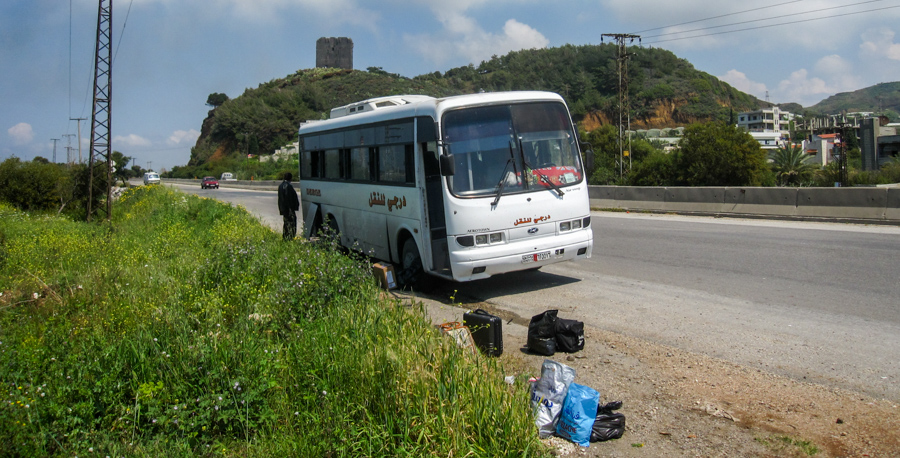
The next day I am on the bus en route to the Crac des Chevaliers, a nice little crusader castle, when everyone starts shouting and I turn around to see smoke boiling somewhere out of the back. When boiling water floods down the floor and out the door I decide it's steam, and by the time we hurriedly evacuate I can barely see inside. My first broken down bus of the trip! We are assured that the company is sending another bus to pick us up, but even so, guys start bailing immediately, flagging down minibuses and disappearing by the twos and threes. I hold off, and after an hour a bus finally arrives, but only enough room for the women and children. I feel like I'm on the Titanic, even though I'm just sitting on the side of the road. By the time I finally make it to the Crac there is only an hour left, but perfect timing for what has to be the best castle/fortress of the trip.
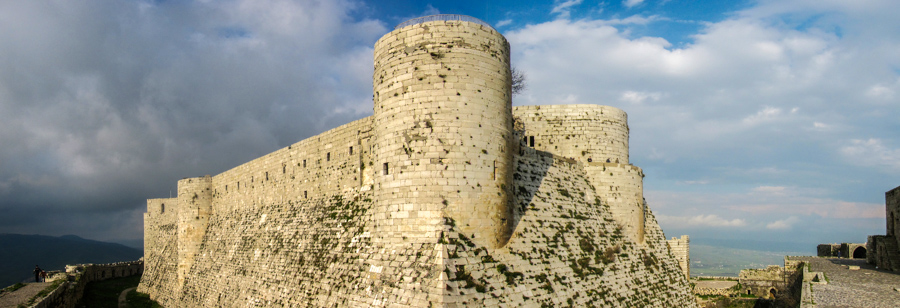
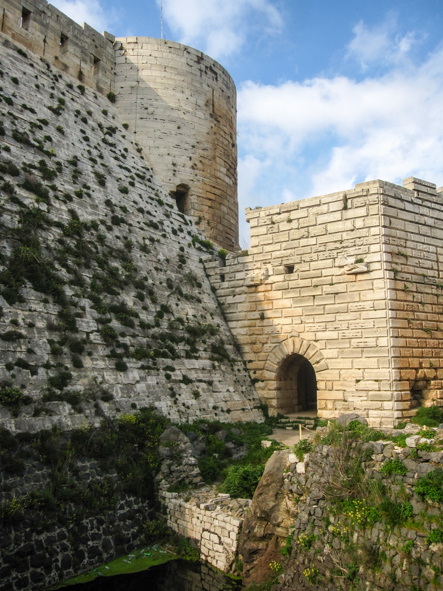
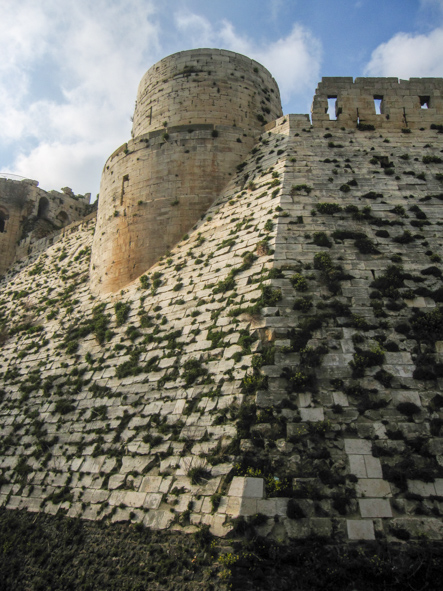
With a inner and outer wall, moat, keep, towers, spiral staircases, and vaulted chambers, what more can you ask for?
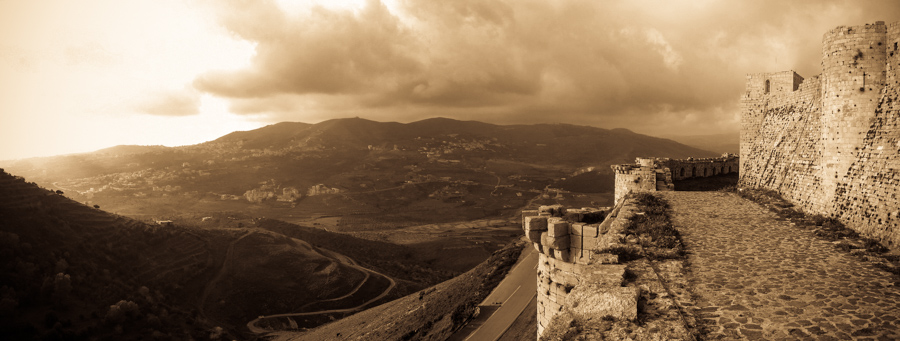
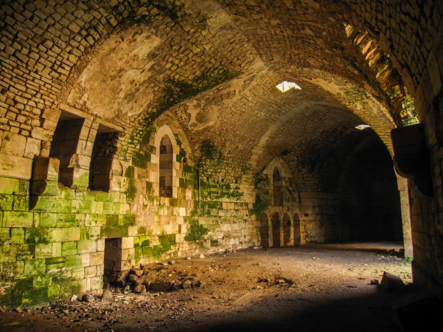
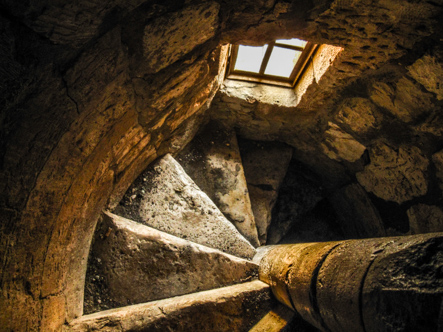
I refuse to pay the exorbitant price for a ride down the mountain to the highway, trying my luck instead at a free lift. The car that eventually stops is some ridiculously looking contraption with two guys in the front seat, who motion me into the back after asking where I'm from and seeming satisfied with California. I pop open the door to discover five (and one more on the front, on the lap) little kids staring at my curiously. They all crowd over to the other side, piling on top of each other, while I have the entire other half to myself. They warm up to me quickly, as their father(s)(?) prod them into trying out their fledgling English on me. My ride to the highway (8km) turns into a ride all the way to Tartus (80km), where they assure me they are headed, but as soon as we get there they find the minibus station for me and head back the other way, to Homs, a hundred kilometers in the other direction. Syria is, above anything else, full of genuinely nice people.
This is probably one of the biggest differences as compared to Egypt or Jordan. There are tourists here, of course, but only some, and almost never big groups. The people seem entirely disinterested in extracting money from tourists, and are instead genuinely curious about who we are, where we're from, what we think of Syria. And in my case, what Americans in general think of Syria. Only once does my American status leave me in limbo - a guy at the bus station in Lattakia asks where I'm from, and my California reply elicits a "America? America no good." response, a shake of the head, and walking off. No one else ever said anything negative about America, though I suspect they may have a slightly different opinion when talking to other nationalities (i.e. my soon to be Canadian traveling buddy).
From Lattakia I head across to Hama, famous for its huge waterwheels and the sound of their groaning, creaking revolutions.
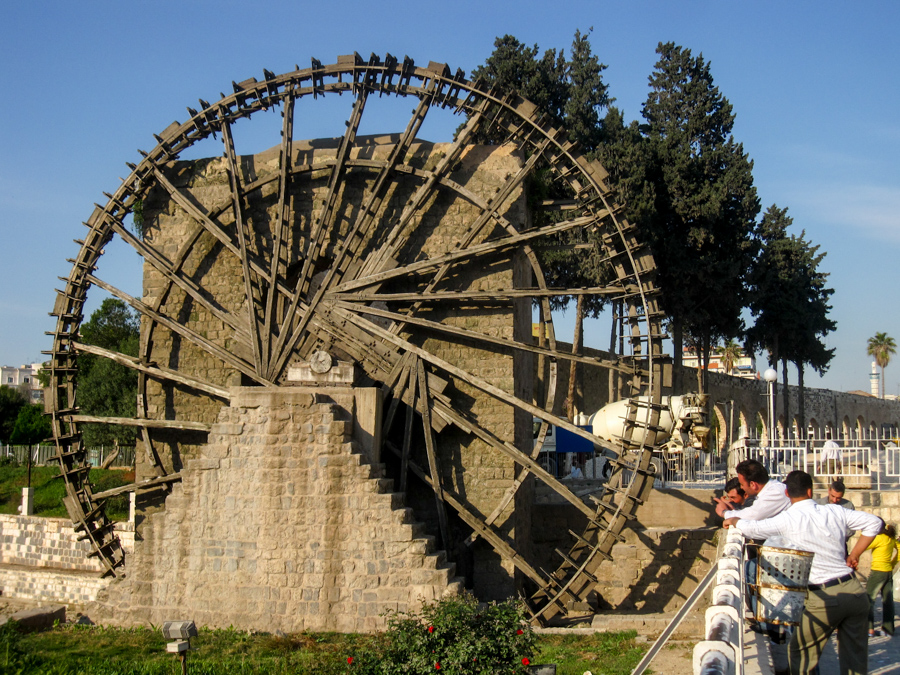
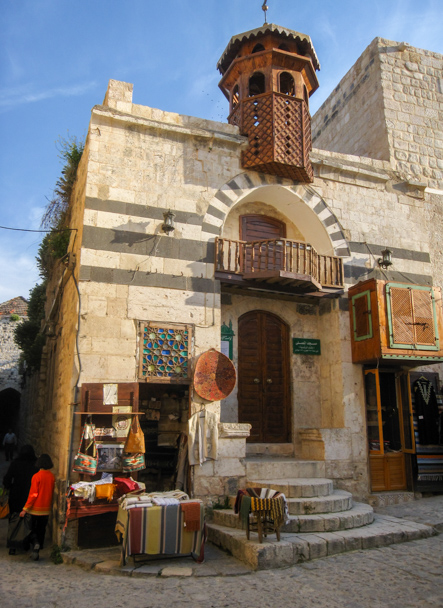
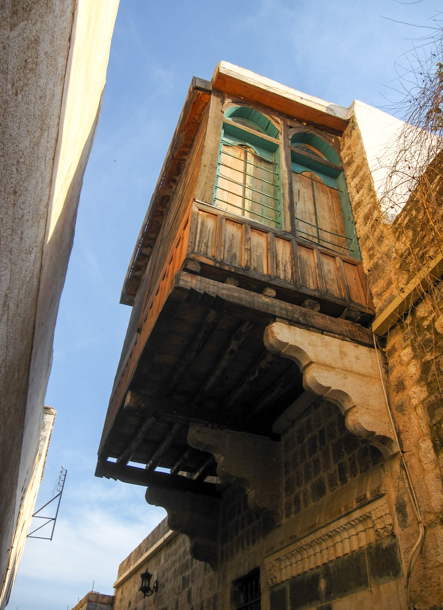
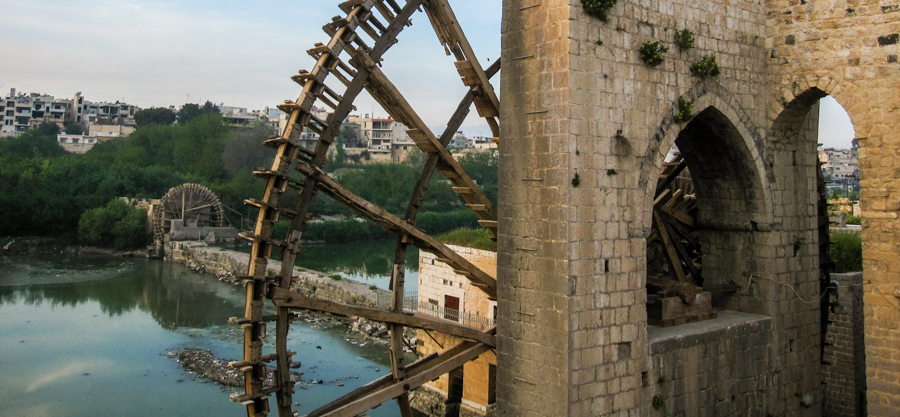
Every stone in its place.
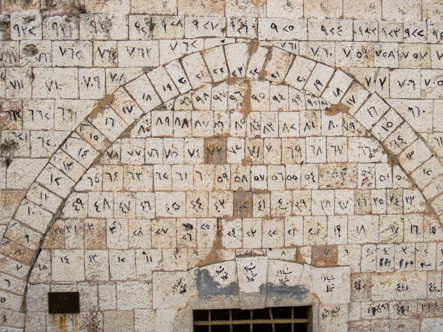
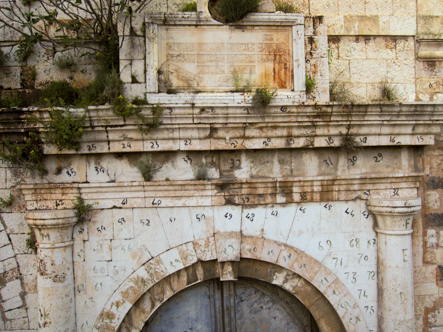
I make a quick jaunt out to Palmyra, way out in the desert, the gem of Syria's roman heritage. The guidebook presents an ominous warning about the buses dropping tourists off outside of town at some hotel, friend of a friend, very Egyptian style. I can't quite believe it when we roll to a stop and the driver motions the tourists off (myself and one other) while all the locals stare at us, waiting for us to get off the bus. The hotel manager is standing outside, waiting for us, and our bags are already unloaded. It is exactly as it was described to me, what a scam. I admit that Palmyra must be the one tourist trap in Syria. But I'm not staying the night, so I grab my bag, toss it back under the bus, and climb back on, asking for the otogar (bus station). I feel a bit sorry for the other chap, but he is beyond saving.

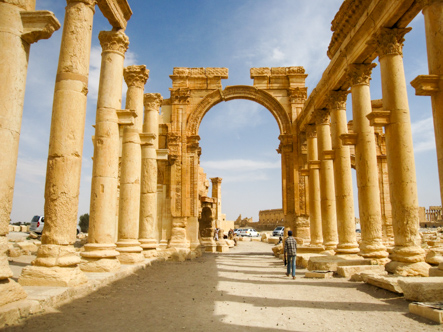
Palmyra is worth it though, a beautiful setting for hundreds of Roman columns, stranded in the Syrian desert.
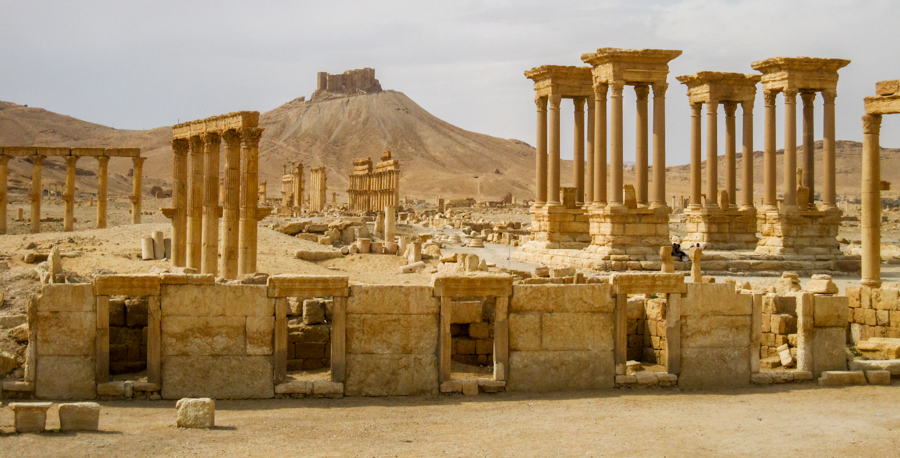
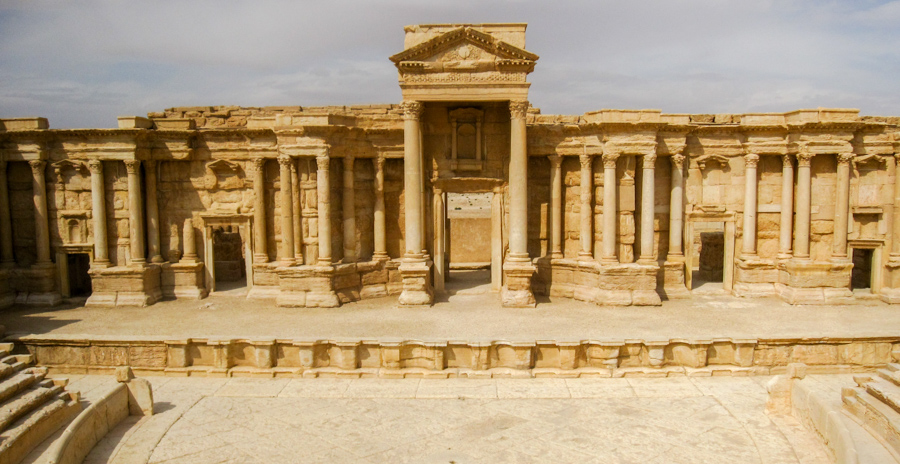
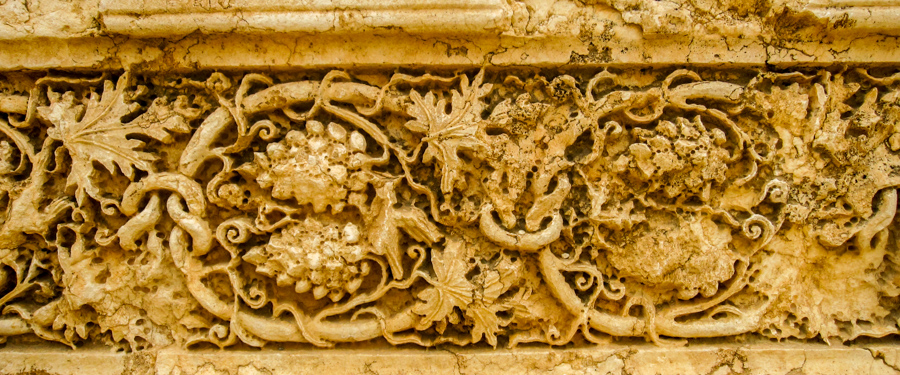
My favorite part may be a dog who ran up to me and flopped down on top of my feet, and as soon as I started moving away he would jump up, run over, and flop down right in front of me again. I have video. I catch the last minibus out back towards civilization, running after it as it pulls away, and the driver tells me some price (150) but some other local helpfully informed me earlier that the correct price was 108 (a strange number I thought). I tell him the right amount and hand it to him - he just looks a bit flustered as all the other locals in the bus burst out laughing and clap me on the back. I get thumbs up from the back seat, and smiles all around. Well done.
In Hama I meet up with Bryn, of the Captain Bob Felucca Adventure, and we will travel together, on and off, for the next two months. After the Quest for the Perfect Falafel is successful in Hama we head up, the next day, to Aleppo, in northern Syria. Aleppo may not be quite as perfect as Damascus, but the Old Town is still beyond amazing.
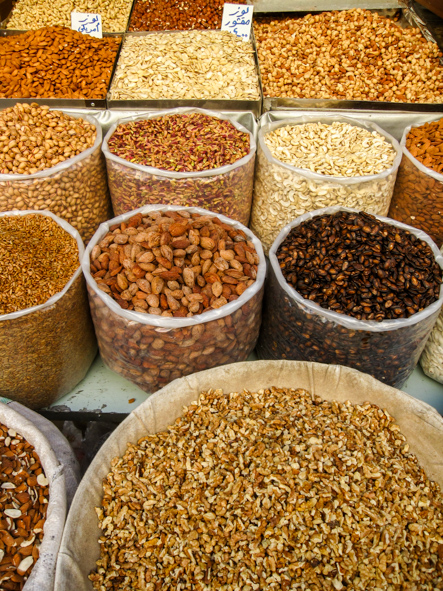
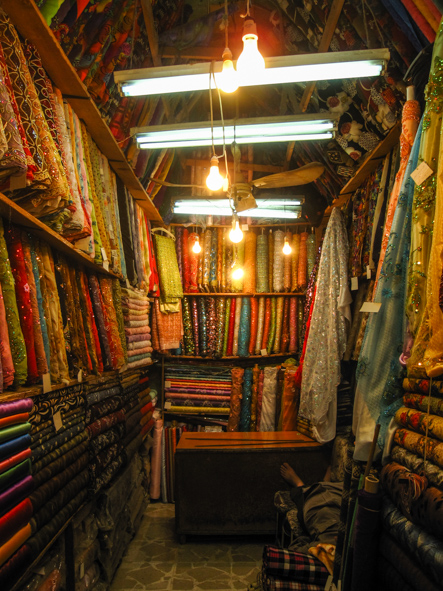
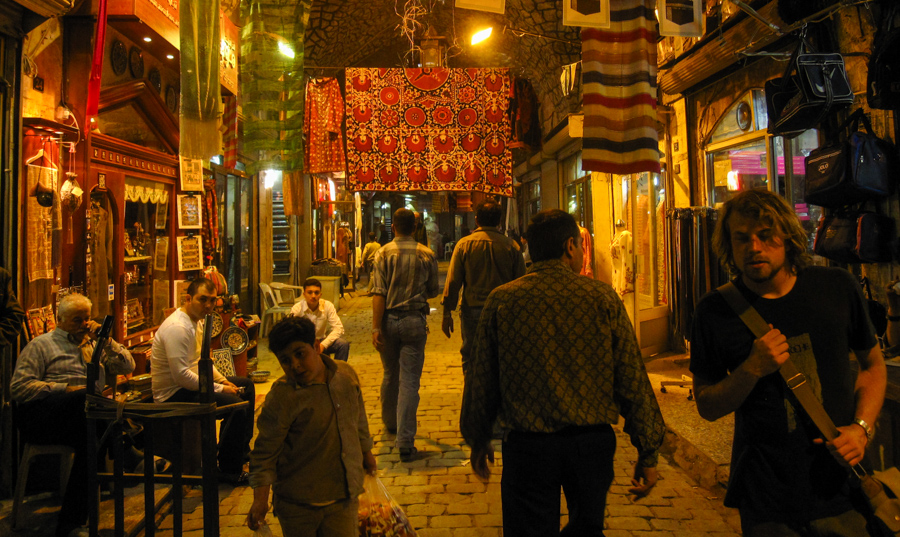
We find the sketchiest neighborhood possible (seems to specialize in car tire repairs) and go in search of the cheapest hotel - a room for 3.5 euros a night! Wanderings through the Old Town, and the Citadel of Aleppo.
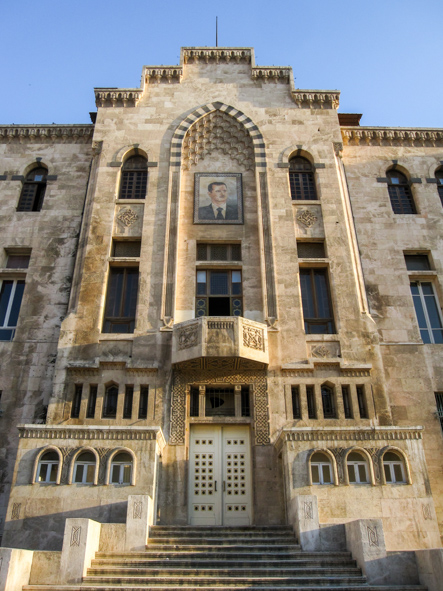

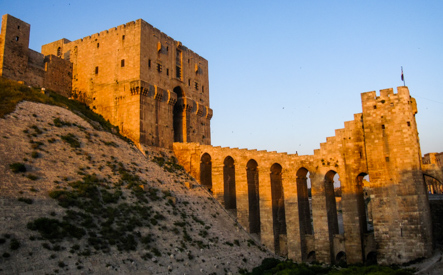
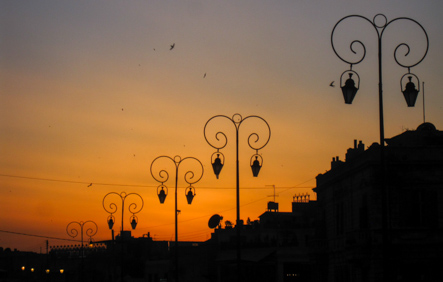
Unfortunately, we only get to stay two nights - that night we practice what will become our favorite activity in Syria, sitting on a bench. Doing so draws Syrians to you, curious, genuine, and just wanting to talk. We meet three guys studying at the University of Aleppo, and agree to meet them the next day at the medicine faculty cafe. Universities, Bryn and I have decided, are generally a good place to see the most beautiful girls in any city.
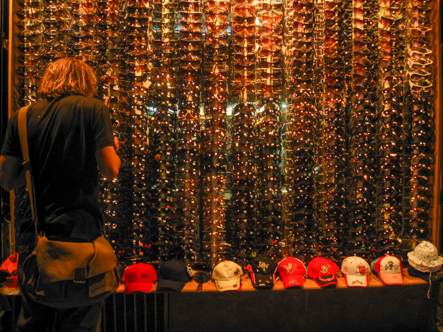
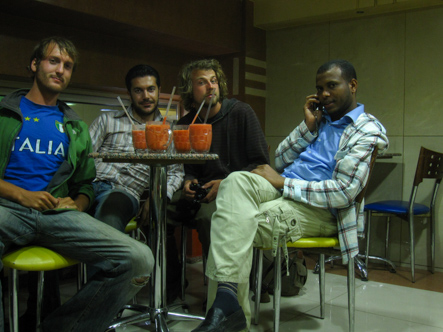
The three guys are Kurdish, and the next few weeks of this trip I learn more than I could have ever imagined about Kurds, Kurdish culture, and the dream which is Kurdistan. This part of the world is more complicated than I ever would have thought - Kurds are a minority in North Syria, Eastern Turkey, Northern Iraq and Western Iran - all want their independence and all, in some way, are the targets of various levels of oppression. Our friends (whose names, strangely enough with Syria how it is, shouldn't appear here) are Kurdish, and Syrian, but although officially we are in the Arab Republic of Syria, they are definitely not Arab. Though, as the perpetual circle of friends continually grows we meet a great many of their friends, both Kurdish and Arab, as well as Kurdish-Arab couples.
We are invited to stay with the ringleader, our host, in his apartment, and decide why not. We spend the next few days exploring Syria, meeting countless friends and attending all the best kinds of parties (lots of music making and dancing, not so much alcohol or other haram pastimes). Aleppo is the most conservative city in Syria, an already conservative place. The majority of women here wear the full black hejab, with only their eyes visible, if that. We ask jokingly how they eat ice cream when they buy it in the bazaar -- this takes place some how.
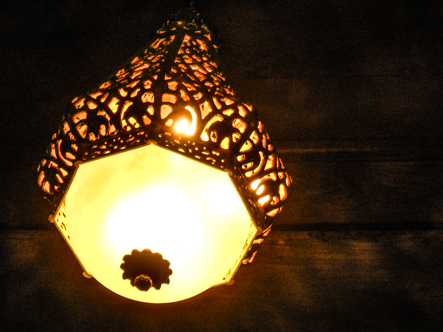
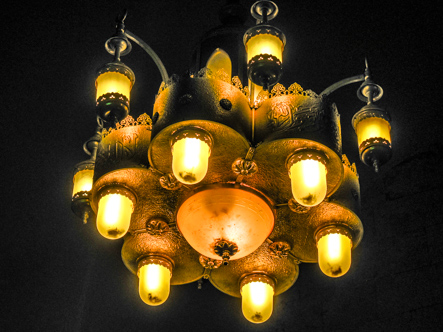
And, I fall in love (the second time on this trip), but she is Syrian, rather devout Muslim (enough that shaking hands with a boy is a no-no). Her name means "Innocence." Still, it doesn't stop her from sitting across the table from me, in her headscarf, and telling me how attractive she thinks I am. One of the more surreal conversations I've had. I don't think it's going to work out.
We join forces with a Mohammed (more or less, one out of every three guys here is named Mohammed) from Sudan, "Sudanese Mo", and hit up the Umayyad Mosque of Aleppo, gorgeous. Things are different when you have a Syrian tour guide.
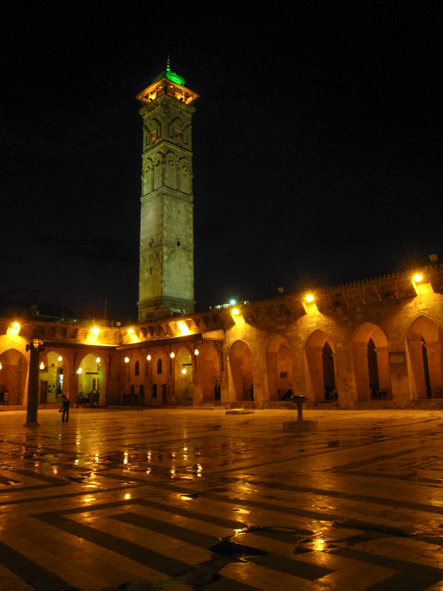
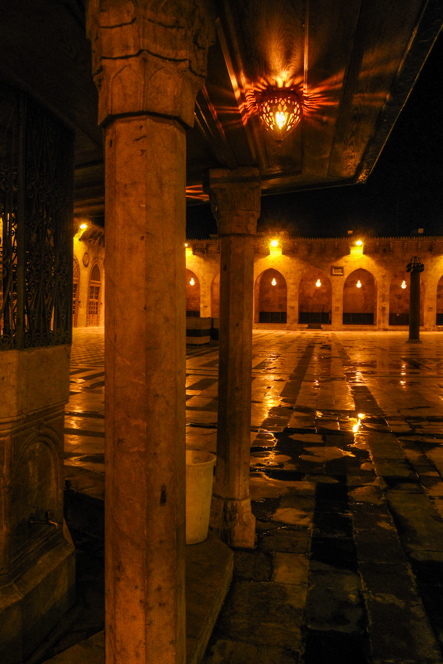
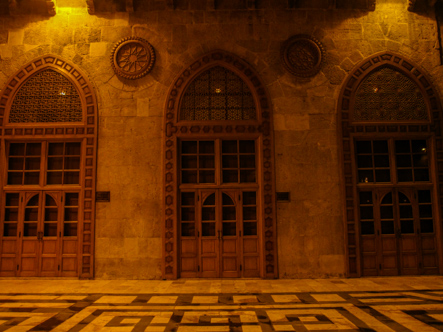
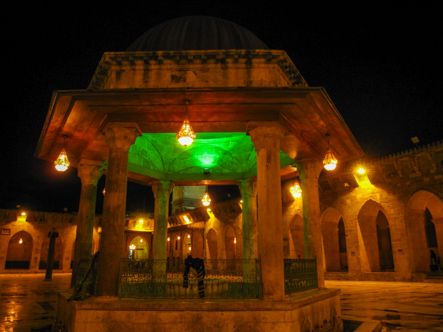
That night we also make it to a hamam (bathhouse), a specialty in the Middle East, and the first for me on this trip. Bryn promises me that it is going to be one of the most homo-erotic experiences of my life. He is, more or less, right. It is a bunch of Syrian guys in their underwear acting like kids, cannonballing into the pool, sweating in the steam room, and continually soaping up and rinsing off. I get a soapy massage from our host, the two of us in our underwear, laying on a marble slab. Bryn goes for the official massage (an all boys club) and I am glad, I think, that I pass.
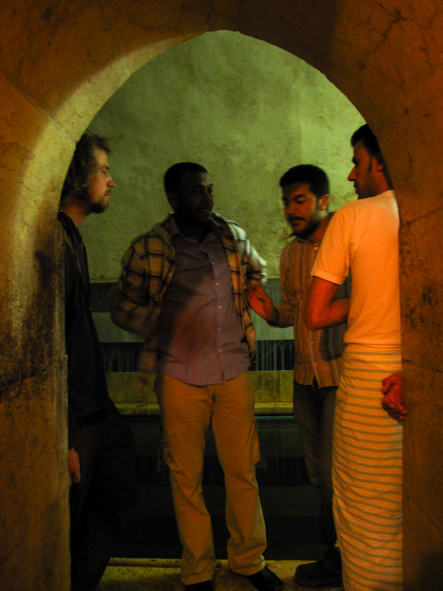
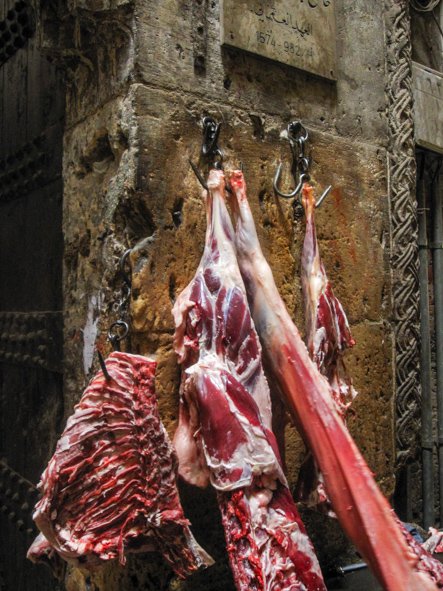
The souq may even top that in Damascus - why not skin a camel and stick it on a hook attached to an iron hook embedded in some ancient door in the bazaar? I'll spare the picture of the head.
We are invited out to meet the family of our host, who live in Ein Al-Arab (also known as Kobane), a small village in Northeastern Syria. Boundless hospitality. And boundless food, in the homes of many of the amazing people we meet here.
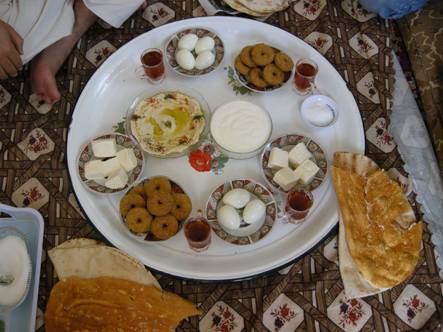
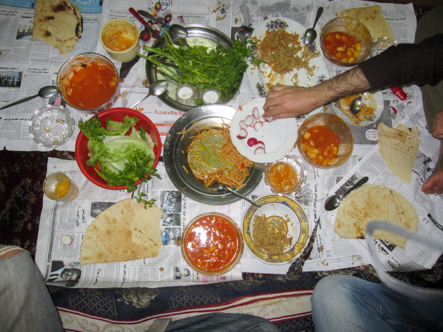
The village of Ein Al-Arab is on the Turkish border, and is most definitely Kurdish. There used to be a border crossing here, but it was closed by Turkey because members of the PKK (the Kurdish guerrilla/"terrorist" organization in Turkey) would cross here and get help from the villagers. I don't think many tourists come here - when we are leaving the bus station in Aleppo the police are not at all happy that an American and a Canadian are headed out to Ein Al-Arab. The minibus driver continually receives calls during the trip, which we later learn are from the police, checking on our progress. The driver insists on delivering us right to the door of the house we are staying at - he has been ordered to, so that he can report back and tell them where we are. After meeting our host's parents, two amazing and very welcoming people, we go out for a walk to the Syria/Turkey border - a railroad track a few hundred meters away.
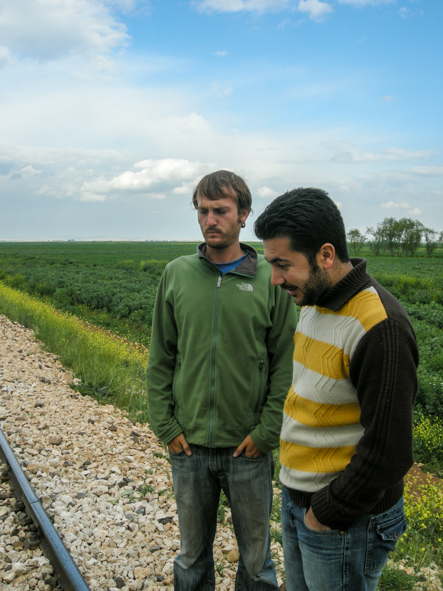
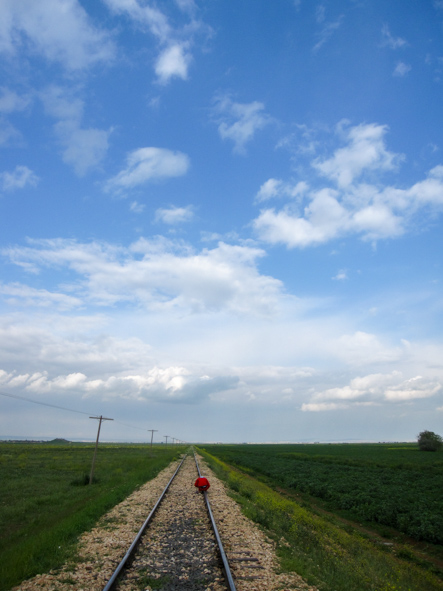
The other side has been mined, by Turkey. A few weeks ago a kid from Ein Al-Arab playing in the field hit a landmine and lost a leg. There is no fence, and we step into Turkey with one foot, but our host refuses to cross the railroad tracks. What appear to be grain silos in the distance, flying Turkish flags, are undoubtedly military outposts. We see a sniper on one later, crossing into Turkey the next day. When we arrive back to the house we discover that the police have stopped by in our absence, and demanded to know what we are doing there, how we know the family, the host, where we met, etc. We agree on a story that is mostly truthful, in case they return. Although Bryn and I think this is quite nonsense, and want to go talk to the police (they avoid openly confronting us, the tourists) we are dissuaded by the family, who are already scared of possible repercussions of our visit. Not wanting to cause trouble, we defer, but still it is insisted that we stay with the family, despite the difficulties. The Syrian police think we are spies for the CIA. Or, more likely, pro-Kurdish supporters here somehow to aid the Kurdish cause or the PKK. They demand to be informed of when we leave and where we are going. We never quite spot them following us, though.
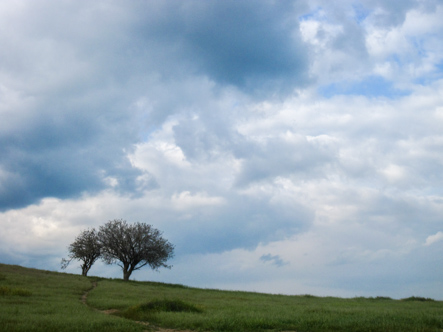
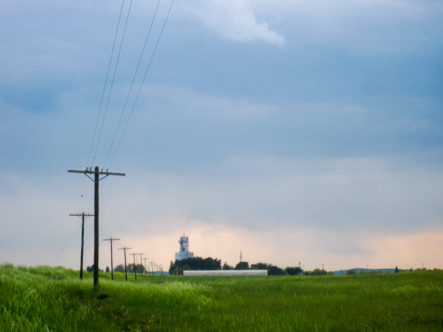
To cross the border into Turkey we go further East, to a town that is predominantly Arab. Along the way there are armed guards (normal looking guys in plain clothes, in an unmarked pickup truck on the side of the road, holding AK-47s and with pistols stuck in the back of their jeans) who obviously are expecting an American and Canadian to come this way, and happily check our passports before waving us on (closer and closer to leaving Syria and becoming someone else's problem, we suspect). Near the border we are finally freed of any driver/police escort, and could have slipped anywhere, outside of this net of paranoia, but decide it is the appropriate time to be leaving. Turkey awaits.
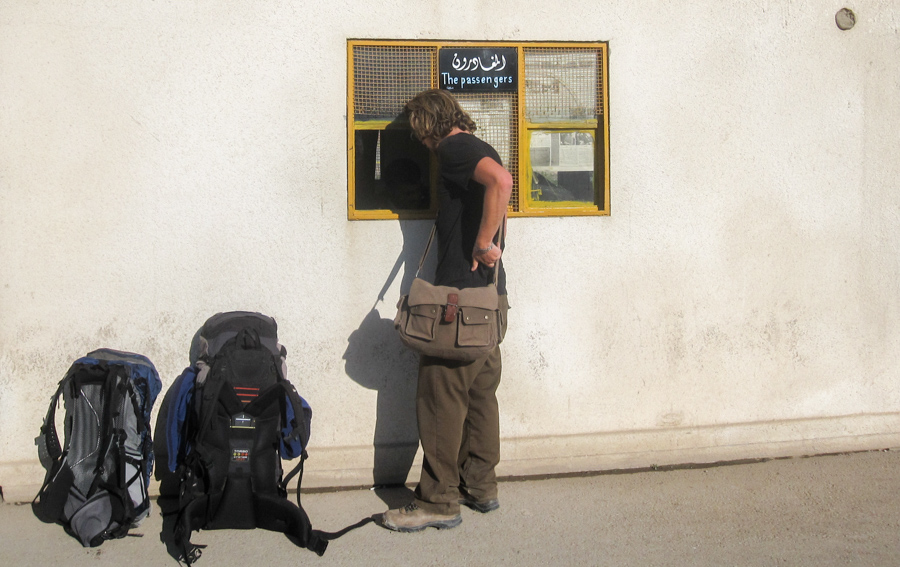
Retrospective: I was in Syria in early 2009. Ten years after visiting these amazing places, almost all have been reduced to rubble. Damascus has been torn apart. Aleppo is, in essence, gone. Ein Al-Arab, the small village on the Turkish border, became a pivotal focus and site of a prolonged siege during the conflict against ISIS, described in a truly terrific New Yorker article. After meeting all these amazing people in Syria, almost all are gone, and some are, without a doubt, dead. We were able to reconnect with many of the Aleppo group: some had moved to Irbil, the capital of Kurdish Iraq, a place of relative safety, even now in the midst of chaos. Ultimately, I visited on the eve of collapse. Two years before the Arab Spring and the Syrian civil war began, I feel privileged to have been able to experience this place. It will be decades before Syria, if all the best of hopes come to pass, can rise from the ruins of war.
